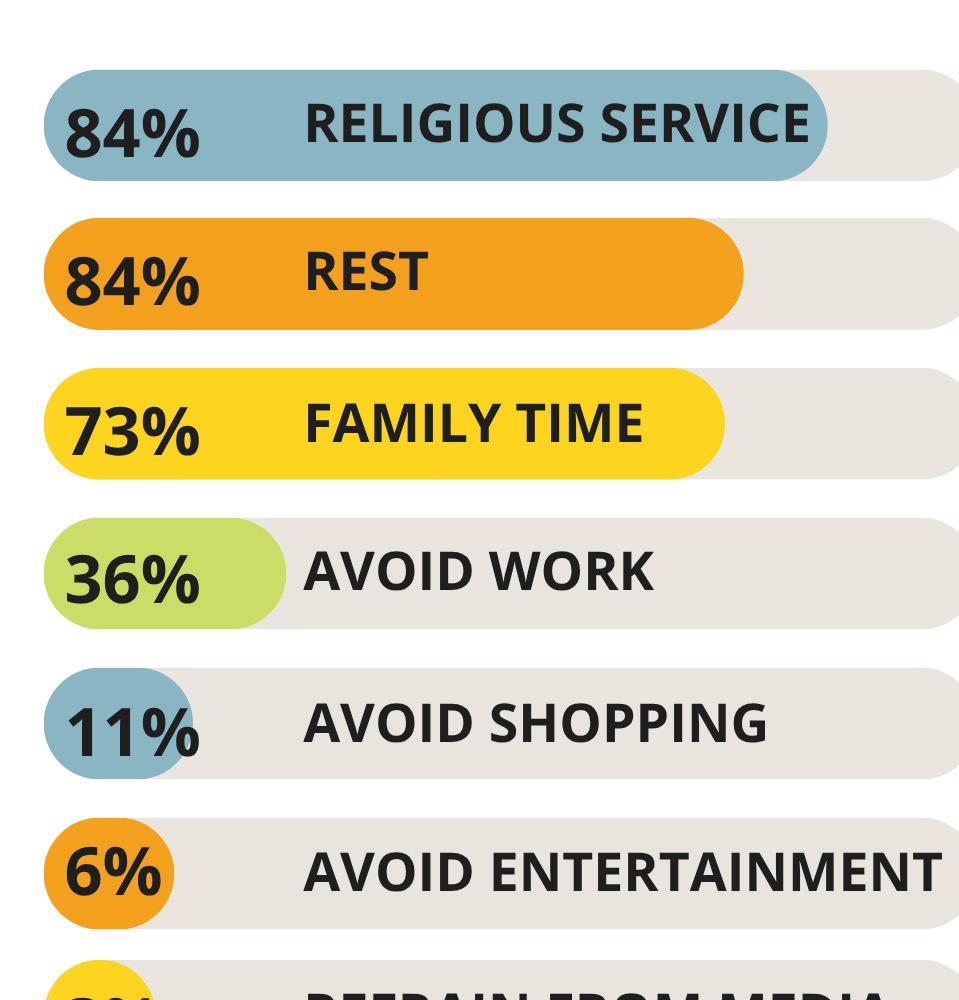Illinois Baptist

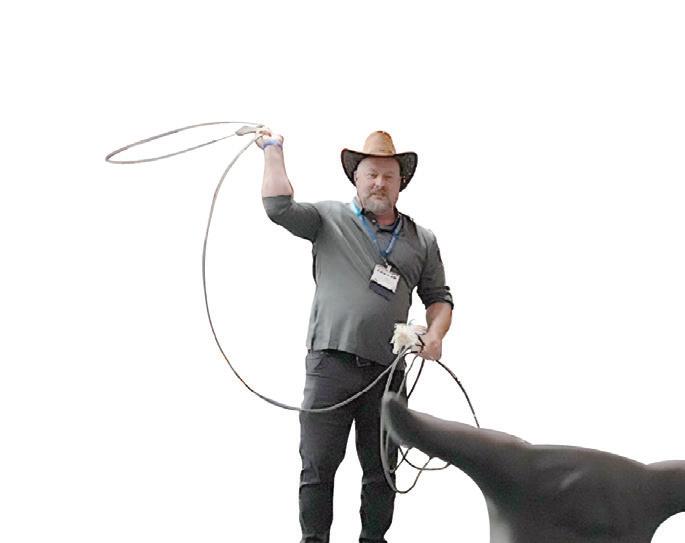



Convention ‘twarnt no vacation.


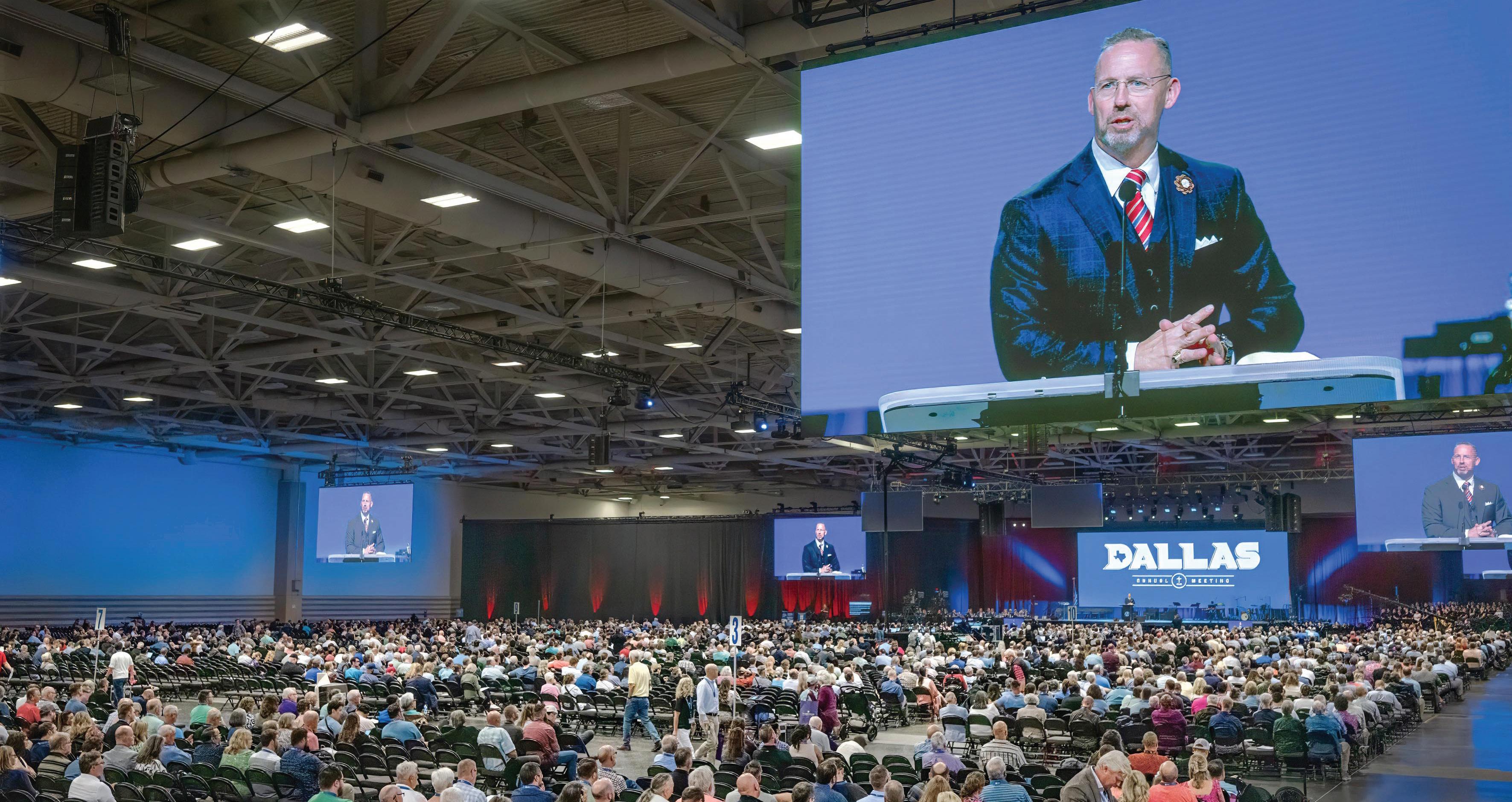







Convention ‘twarnt no vacation.




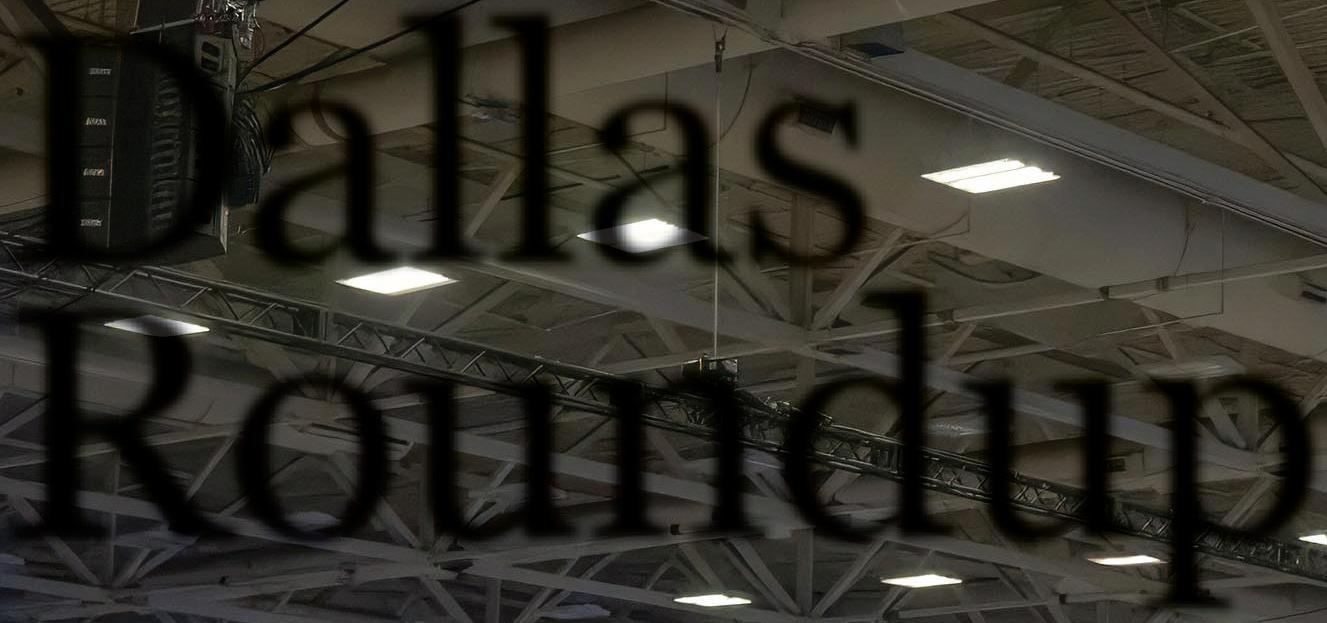





Southern Baptist Convention
Messengers address culture, morality, family
Dallas | Jacksonville, Illinois native Andrew Walker led the committee that pushed back on same-sex marriage and gender issues, chemical abortion, and sports betting at the 2025 SBC Annual Meeting in Dallas
June 10-11. And messengers passed all eight resolutions presented by Walker and the Committee on Resolutions with only one minor amendment.

“There is very little desire, even on the conservative side, I think, to go to bat for marriage in this…culture,” Walker said at a news conference following the vote, so this resolution serves notice that “Southern Baptists are not going anywhere on this issue.”
Walker said he was “clear-eyed about the difficulties and the headwinds in this resolution.”
Walker serves as the associate dean in the school of theology at Southern Baptist Theological Seminary and he works with the SBC’s Ethics and Religious Liberty Commission.
Another Illinoisan, Obbie Tyler Todd of Marion’s Third Baptist Church, was also on the ten-member committee.
The resolution that proved to be the centerpiece addressed multiple issues related to family and morality. It encouraged defunding Planned Parenthood, also a goal of the ERLC, and directing public funds toward “lifeaffirming healthcare providers.” And it condemned “commercial surrogacy,” often a part of invitro fertilization. With Southern Seminary President Al Mohler, Walker co-authored a resolution opposing IVF that the convention approved in 2024 after considerable pleas from messengers who have used IVF to have children.
The resolution on “Restoring Moral
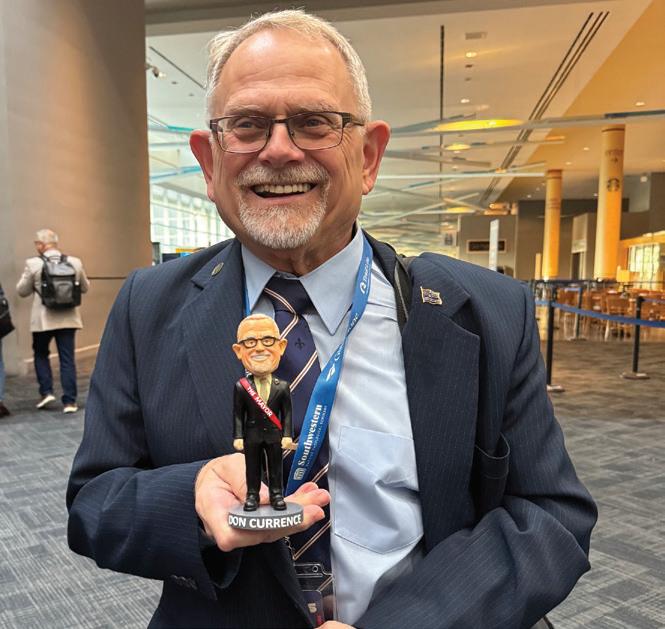

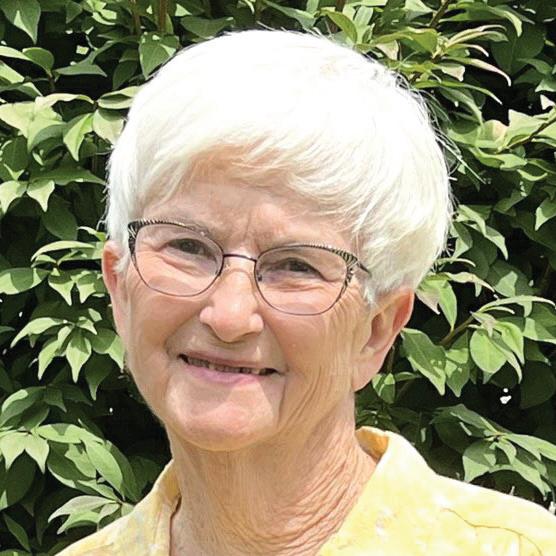


Total giving by IBSA churches as of 5/30/25 $2,178,759
2024 Budget Goal to date: $2,580,903
2024 Goal: $6 Million


Hope Howard writes “Jesus loves you” on the sidewalk outside of the Emerald Run apartment complex during the block party hosted by Creekstone Church on June 7. Howard traveled with her family from Casey, Illinois, to serve during Crossover 2025, an annual evangelistic emphasis ahead of the Southern Baptist Convention Annual Meeting.
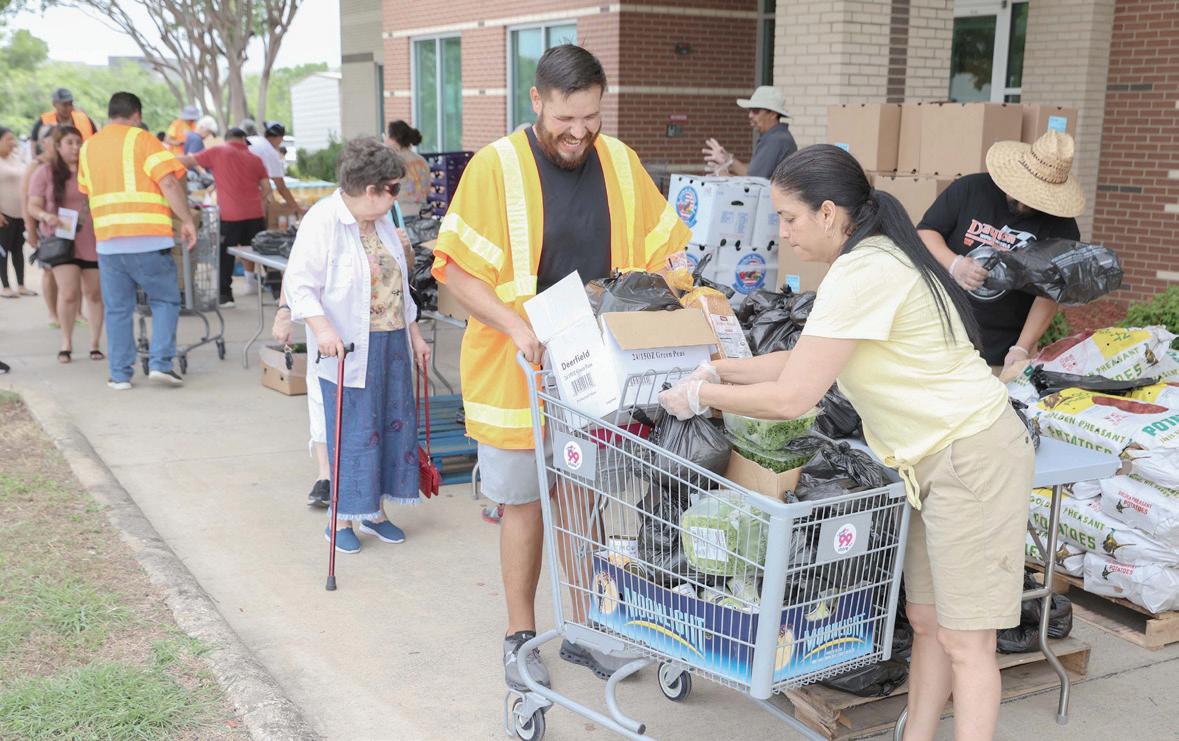
The same spirit that drives SBC missionaries globally was on display all over Dallas during Crossover 2025 as Baptists converged to share in outreach projects, such as this food bank in Mesquite.

The Illinois Baptist staff
Editor - Eric Reed
Contributing Editor - Lisa Misner
Graphics & Production Manager - Nic Cook
Team Leader - Ben Jones
The general telephone number for IBSA is (217) 786-2600. For questions about subscriptions, articles, or upcoming events, contact the Illinois Baptist at (217) 391-3127 or IllinoisBaptist@IBSA.org
The Illinois Baptist is seeking news from IBSA churches. E-mail us at IllinoisBaptist@IBSA.org to tell us about special events and new ministry staff.
POSTMASTER: The Illinois Baptist is owned and published every month by the Illinois Baptist State Association, 3085 Stevenson Drive, Springfield, Illinois 62703-4440. Subscriptions are free to Illinois Baptists. Subscribe online at IBSA.org.

The 2025 Southern Baptist Convention is behind us, and with it the meetings, reports, motions, and actions that pleased some and disappointed others. I know that many church members and even pastors rarely or never attend an SBC in person. That was true for me until I was almost 40, so I appreciate the reality that, for many, the national SBC seems very far away from local church life.
At the same time, social media now invites all of us into the issues and advance debates that precede the convention. Technology makes it possible to watch at least the main sessions of the SBC online. And for us here in Illinois, upcoming conventions in Indianapolis and St. Louis make direct participation very accessible.




















For those interested in engaging more deeply in national SBC life, let me offer one overarching recommendation, based on my experience and observations throughout now 30 SBCs. Focus intently on the what and the why of the Southern Baptist Convention, and don’t get mired in the how and who.
This was never more evident to me than this year in Dallas. When we were focusing on our shared, biblical beliefs—the why—and on our shared, cooperative mission of taking the gospel to the world—the what—we experienced unity, celebration, and joy. The more we descended into debates about precisely how to protect those beliefs, or who should lead various aspects of the mission, there was more disagreement, and more distraction.
As in our churches, the SBC, especially through its elected trustee boards, must deal with the essentials of how and who. But it’s there that we are more likely to find honest differences of opinion or perspective. And it’s there that as Baptists, as a priesthood of believers, we depend on prayerful, Spirit-led wisdom through civil discourse and democratic processes to lead us to the Lord’s will for the moment.
Don’t get mired in the how and who of SBC.
It’s then that we should graciously release our secondary differences and preferences on how to do something and who should lead it, and return quickly to the unity we find in the why of our biblical beliefs and the what of the Great Commission.
That unity was also wonderfully demonstrated in Dallas this year. Yes, there were a few close or divided votes. I’ve found myself on both sides of those over the past 30 years. But then we celebrated 100 years of The Baptist Faith and Message, and the blessings of clarity and unity and confidence our biblical statement of faith has provided. And then we celebrated 100 years of Cooperative Program giving, that has fueled with more than $20 billion the multiplication of Baptist missionaries and congregations and ministries across the nation and around the world for generations.
During those moments of inspiring worship and celebration, few thoughts were preoccupied with whether our point of view prevailed in a vote, or whether our candidate won an election. Through ten-thousand-voice worship, timely biblical messages, inspiring reports of missionary sacrifice and victory, and encouraging fellowship with new friends and old acquaintances, we effortlessly united in biblical devotion and cooperative missions.
That’s where I want to stay focused, this side of the 2025 SBC. And that’s my recommendation as we continue to engage as diverse Southern Baptists from across our convention. Sure, exchange well-informed opinions and mutually respectful perspectives on how to do things and who should lead. But then set those differences aside. Trust our democratic consensus to be trustworthy for now, and to receive correction or improvement as needed over time. But always come back quickly to the biblical beliefs that unite us and the missional cooperation that makes even our disagreements ultimately worthwhile.
Nate Adams is executive director of the Illinois Baptist State Association. Respond at IllinoisBaptist@IBSA.org.
from the front: illinoisans lead resolutions on family and values
Continued from page 1
Clarity through God’s Design for Gender, Marriage and the Family” comes on the tenth anniversary of the U.S. Supreme Court’s 5-4 decision legalizing same sex marriage nationwide. Messengers voted to support overturning that ruling, Obergfell v. Hodges
“Andrew Walker did a fine job leading the resolutions committee,” concluded Denny Burk, Boyce College professor and president of the Council on Biblical Manhood and Womanhood. “They produced what has to be one of the strongest and most conservative slates of resolutions we’ve ever seen,” Burk said, “and it was largely uncontroversial.” Uncontroversial with the messengers, that is.
The resolutions were called alternately “the most conservate” ever seen, “throwing red meat to the base,” and declarations of war on gay culture, depending on the pundit. When the Dallas Morning News and other national news outlets focused on the opposition to same-sex marriage, Baptist reporters covering the convention asked, “Why were they surprised?”
The resolution was 1,000-words long, an omnibus statement saying God created all humans “as either male or female in accord with his good design for humanity, equal in worth but different by design, and this difference is not accidental or arbitrary.” It criticized contemporary culture for “redefining marriage, pursuing willful childlessness which contributes to a declining fertility rate, ignoring and suppressing the biological differences between male and female, encouraging gender confusion, undermining parental rights, and denying the value and dignity of children.”
On sports betting Committee member Lemanuel Williams, lay pastor of Redeemer Church in Rocky Mount, N.C., presented Resolution 3 on the harmful and predatory nature of sports betting. Williams works in the inner city and sees its direct effects. “We’re upholding this, not just for our good, but for the common good,” he said. “We want to see flourishing for all people. And it’s not doing that. [Sports betting] is dehumanizing people.”
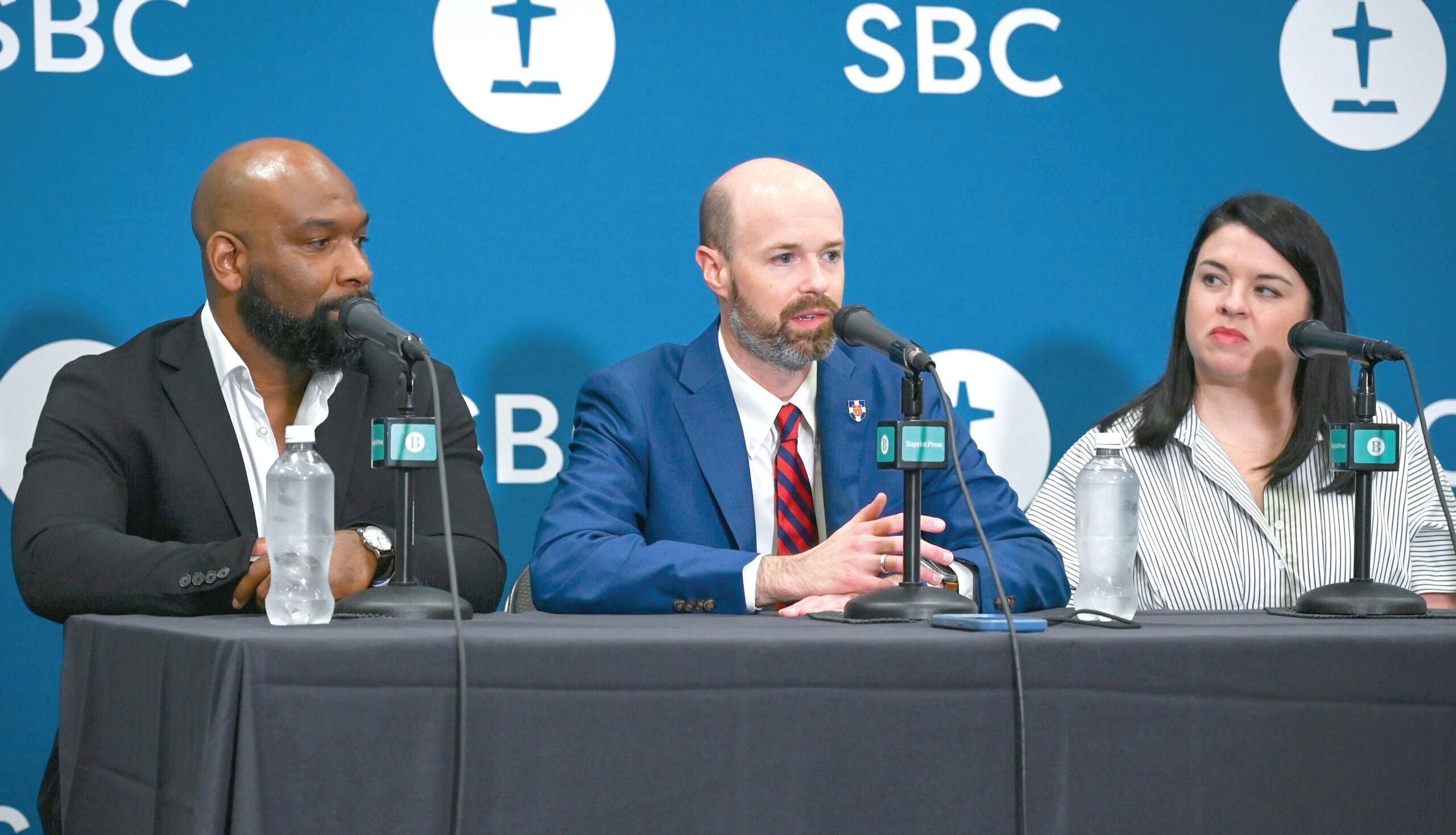
On pornography
Whitney Alexander, a women’s ministry leader at First Baptist Church in Gadsden, Ala., where her husband, Mat, is pastor, presented Resolution 4 that calls for a ban on pornography. “We have a responsibility to speak, to say it out loud, to not be afraid to say this is an issue,” she said. “It’s an issue not only in the lives of individuals and the lives of families, but it’s an issue in America.”

On chemical abortion
A resolution “On Standing Against the Moral Evils and Medical Dangers of Chemical Abortion Pills” cites Scripture that teaches all human life is sacred and notes the SBC consistently has affirmed the sanctity of “preborn life” and opposed all forms of abortion. Messengers turned aside efforts to expand the definition beyond fetal status and to call all participants in abortions, including the pregnant women, “murderers.”
On religious freedom
One messenger sought to tweak the language on betting, allowing for small wagers on games and the purchasing the occasional lotto ticket as not sin in themselves, but possibly leading to “sin through gambling” rather than the “sin of gambling.” He lost, as fellow messengers eventually rejected his amendment.
A resolution about international religious freedom generated debate on the extent of such freedom outside the U.S. Ultimately the resolution passed as written.
“Many of our brothers and sisters around the world live in fear for their lives and livelihood as a result of professing Christ and practicing their faith in nations which are led by leaders who deny religious liberty and freedom of worship,” the res-



olution stated. In addition to calling for prayer, the statement urged “the United States government to continue its efforts to advance religious freedom globally through its congressional and diplomatic bodies.”
“Resolutions are not binding, but they are clarifying. In a time of moral confusion and cultural drift, these resolutions help Southern Baptists say, with one voice, what we believe and why it matters,” Walker said prior to the Dallas convention. He said he hoped the eight resolutions wouldn’t be used to “settle debates” but to “shape discipleship.”
“They are intended to strengthen our churches in conviction, inform our witness to the watching world, and provide clarity to policymakers, media and fellow Christians about where we stand,” Walker said.
Resolutions on appreciating the city of Dallas, on commemorating the 100th anniversary of the Cooperative Program, and a resolution honoring the centennial anniversary of the Baptist Faith and Message and the 25th anniversary of its 2000 version, were presented individually and passed with little to no discussion.
—IB staff, with additional reporting from the Alabama Baptist, Baptist Press, and the Baptist Standard.



Jennifer Lyell, 47, died June 7 after a series of strokes. Lyell was a former vice president with Lifeway Christian Resources who accused her mentor and professor David Sills of sexual abuse. Lyell had sat for a deposition in a defamation suit against the SBC in April, portions of which were released May 20 after they became part of the federal suit.

Lyell had not sought to release information about the case, but some details emerged about incidents that she said were abuse but Sills said were consensual. Lyell was depicted as a whistleblower who received little sympathy or support from SBC leadership in mainstream media reports starting in 2019.
Sills’s suit results from his inclusion in the Guidepost Solutions investigation of abuse claims and how they were handled within the denomination.
Outside the Dallas convention hall, a protesting couple held up a large photo of Lyell that read “Woman of valor” and another saying “God weeps while you look away.” Inside, Marshall, Illinois pastor Paul Cooper, who attended Southern Seminary with Lyell, rose to the microphone after the seminary report. He asked President Al Mohler if Mohler might pray for Lyell’s family and friends in their grief. Mohler had previously stood with Lyell, Cooper said, and it seemed appropriate that she should be mentioned in the convention.
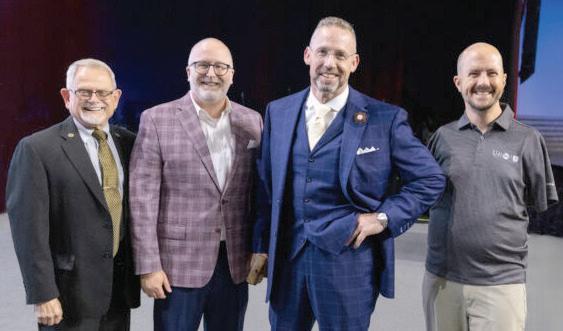
Dallas | Three of the five officers of the Southern Baptist Convention were returned to office, including Clint Pressley, who took a second one-year term with 94% of the vote by messengers in Dallas. But it was the election of first vice president that drew the most attention because of the winner’s backstory.
Daniel Ritchie, now an evangelist, author, and member of The Summit Church in Durham, N.C., was born without arms. At his birth, his parents were told to let the child die, but they determine to overcome the disability. So did Ritchie.
warning against “microwave mentality,” meaning “if something cannot be done in five minutes or less, it is not worth doing.”
“The Father does not conform his work to our broken perspective of time. He is not in a hurry; we are… We need to give ourselves the space to soak in the fact that our Creator and Savior love us dearly. We must carve out pockets in the day to stop and commune with the eternal God beyond the space of our Sundays.”
After his election, Ritchie stood on the platform in Dallas with his wife and daughter. On social media, his election was hailed as inspiring.

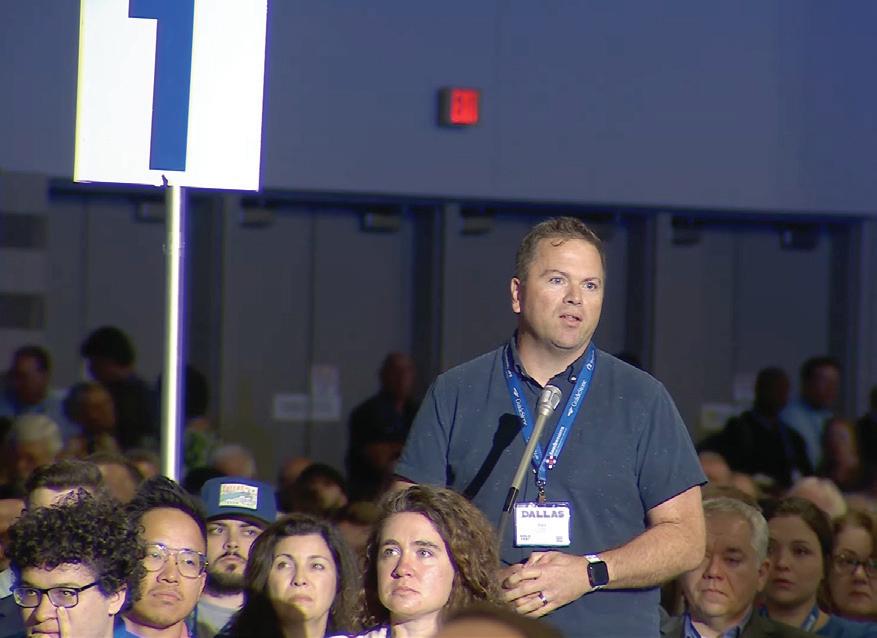
Mohler prayed. “We recognized that sometimes just to invoke one name is to invoke an entire legacy of suffering,” he said, acknowledging the larger abuse tragedy. “Discipline and instruct southern Baptists at every level to be faithful at every level in responding to sin in every form,” Mohler asked. In addition to healing for broken hearts, “we also pray for righteousness; that would be your gift.” —IB staff, with information from TAB media and Christianity
In his book “My Affliction for His Glory,” Ritchie tells how he met the challenges related to being born without arms. His story emphasizes the importance of faith and finding God’s purpose in his life.
After coming to faith as a teenager, Ritchie served two churches as student pastor, and has spent 20 years on the road as an evangelist. He preached at the SBC Pastors Conference in Anaheim in 2022.
That year he wrote an essay for Christian Post
Also elected were (pictured left to right) Don Currence of Ozark, Mo., who ran unopposed for his seventh term as registration secretary; Nathan Finn, who ran unopposed for his fourth term as recording secretary, and (not pictured) Craig Carlisle, director of missions from Gadsden, Ala., as second vice president.
—with info from Baptist Press and Christian Post
Lawsuit involves defamation claims in “friendly cooperation” probe
Nashville, Tenn. | The Tennessee Supreme Court will hear the appeal of the Southern Baptist Convention in a case connected to an inquiry by the SBC Credentials Committee.
Preston Garner, a longtime worship pastor and school music teacher, and his wife, Kellie, filed a defamation suit in 2023 against the SBC, Guidepost Solutions, and others. The Garners claim the SBC defamed them while following up on a confidential report made to the SBC’s abuse hotline.
The SBC argued in court that it was protected by the church autonomy doctrine, a First Amendment right which keeps courts from interfering in disputes with religious bodies that involve religious faith, doctrine, or governance. Two lower courts rejected the SBC’s argument. The SBC asked the Tennessee Supreme Court to step in, which it has now agreed to do.
“Churches have a sacred calling to protect their flocks. When a church leader in a position of trust is accused of serious misconduct, religious bodies must be free to take action without being dragged through intrusive, costly, and unnecessary litigation,” senior counsel Daniel Blomberg told Bap-
tist Press in written comments.
The SBC’s abuse hotline, which is maintained by Guidepost Solutions, received a report in 2022 from a woman claiming that Garner had sexually abused her 12 years prior when he was serving as interim pastor in North Carolina.
An SBC employee, on behalf of the Credentials Committee, sent a letter to Everett Hills Baptist Church in Maryville, Tenn., where Garner had been employed as worship pastor about the possibility that the church “may employ an individual with an alleged history of abuse.”
At the time the letter was sent, Garner was also employed as a music teacher at The King’s Academy, a Christian school. He was set to take another position at First Baptist Church of Concord, Tenn. Garner said he ultimately lost both jobs because of the SBC letter.
The Tennessee Supreme Court’s order gave six more denominations permission to file amicus briefs. The case will be placed “on the docket for oral argument upon the completion of briefing.”
—excerpted from Baptist Press
Our annual Rodeo at-a-glance
$190 million operating budget approved, funding International and North American Missions, 6 seminaries, and ERLC.
11 entity heads and 1 auxiliary leader brought annual reports.
28 motions made. 21 referred to responsible entities, 5 ruled out of order, 2 brought for messengers’ vote. ERLC is saved as messengers turned back motion to abolish SBC public policy voice.
58 missionaries commissioned, prayed over, and sent to their new fields. Half will work under assumed names where being a Christian is unsafe.
100 years of Cooperative Program and Baptist Faith & Message celebrated.
3,000 participants joined with 89 churches for Crossover with 711 salvations reported.
1 award given to Illinois’ Evelyn Tully by the WMU Foundation for a lifetime of mission service.
1 Bobblehead presented to Recording Secretary Don Currence, AKA “The Mayor.”
10,599 messengers and 4,141 guests for the Annual Meeting.
172 Illinoisans were among them. These prairie sodbusters roped the calf at the cowboy-themed Illinois reception. (Turns out Pastor Tommy Thompson of the southwest Chicago suburbs is our own Ted Lasso.) IBSA Board Chair Bruce Kirk of Bolingbrook (right) came in a close second.
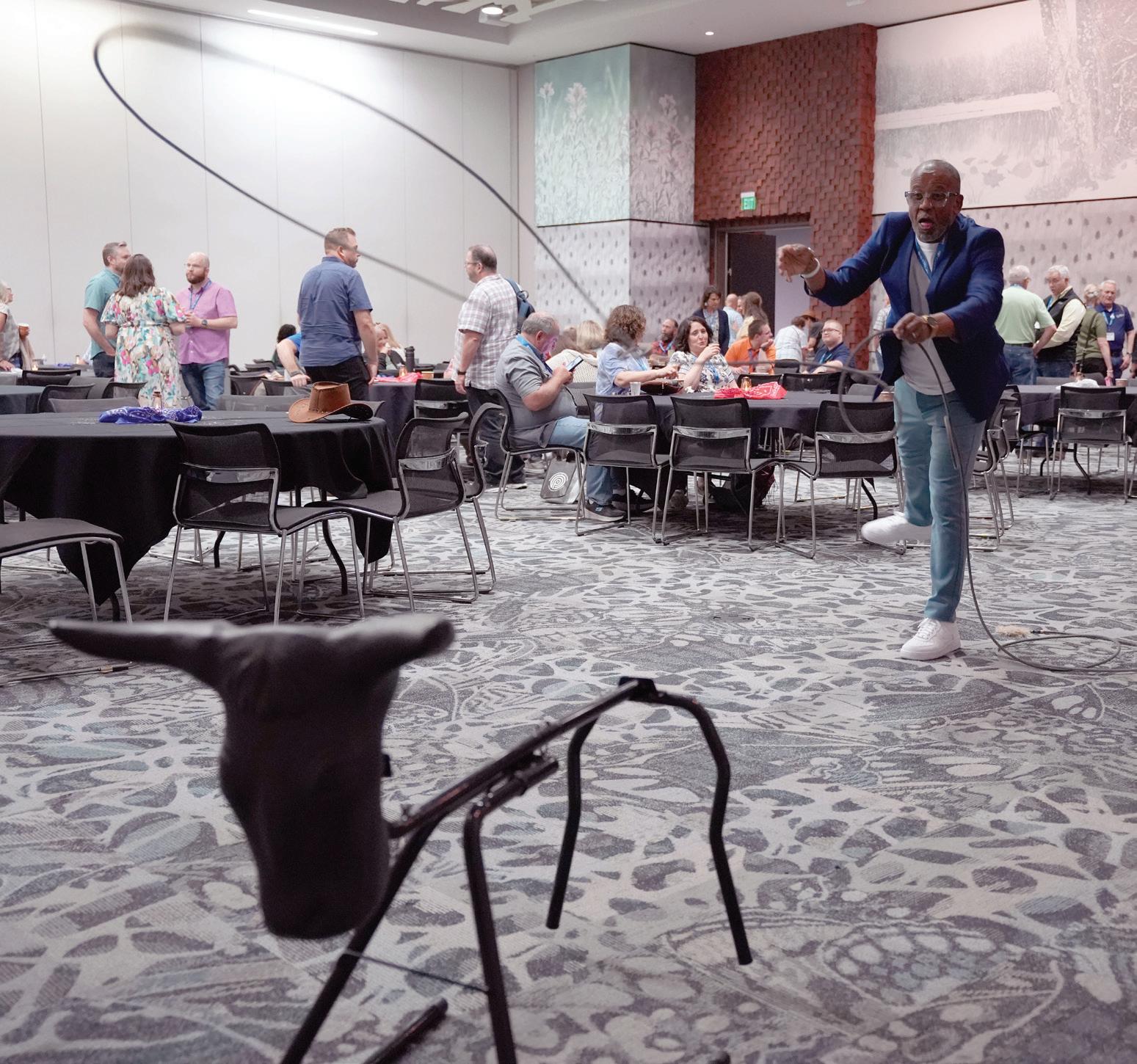
Messengers wrestled key issues to the ground, but overall, the Convention ended where it started.
ILLINOIS BAPTIST TEAM REPORT
Dallas | “Holy moley!” Clint Pressley declared several times as he presided over the 2025 Southern Baptist Convention Annual Meeting in Dallas June 10-11. But his interjections were not about the troubles many had expected. Messengers arrived to the probability that rancorous arguments we’ve heard before would steal the spotlight from the centennial celebration of SBC mission funding and doctrine. In the business sessions, they did. But in the end, motions on three major issues failed to receive the majorities required for passage, mostly by the same margins as they did last year.
And leaving Dallas, the SBC is right back where we started:
The constitutional language about pastors is unchanged, although the Baptist Faith and Message language says the pastorate is limited to men.
SBC entities will not be required to submit a form like the IRS 990 detailing assets, leaders’ salaries, or “golden parachutes.”
The Ethics and Religious Liberty Commission (ERLC) lives to fight another day, as messengers saved the denomination’s public policy voice.
Continued from page 5
As SBC President, Pressley likened the debate to a family wrestling over its issues. When they leave the room, they’re still family. “We’re alright having these conversations as long as we continue to keep our focus on why we actually meet together,” Pressley said at a news conference following the two-day convention.
“Although we had a lot of discussion about several things, there wasn’t a real sense of a contentious spirit in the room,” Pressley said. That stands in stark contrast to two previous years of argument, particularly over women as pastors and the SBC’s language affirming men only as lead pastors.
A resolution on gender issues drew the most national attention. A few secular news outlets focused on the call to end same-sex marriage by overturning the U.S. Supreme Court decision that legalized it a decade ago. Illinois native Andrew Walker led the committee that brought the slate of resolutions on moral issues, abortion pills, and sports betting. (See story on page 1.),
“If the amendment passes, it may be helpful to Southern Baptists in the long run. I don’t know. But I know it will be expensive.”
Jeff Iorg on legal liability of the Law/Sanchez Amendment codifying male-only pastors
Outside the business sessions and missions reports, the meeting marked the 100th anniversaries of The Cooperative Program and the Baptist Faith and Message. The meeting’s expressed intent was to celebrate these “rails” on which the SBC’s mission runs, as Pressley put it in his President’s Address. (See story on page 8.)
Big debate #1: Women pastors
A motion to amend the SBC Constitution to clarify language about male-only pastors failed to receive a required super majority for passage. The vote by ballot was 3,421 (60.74%) in favor, and 2,191 (38.90%) against, missing the two-thirds threshold by the same percentage as 2024.

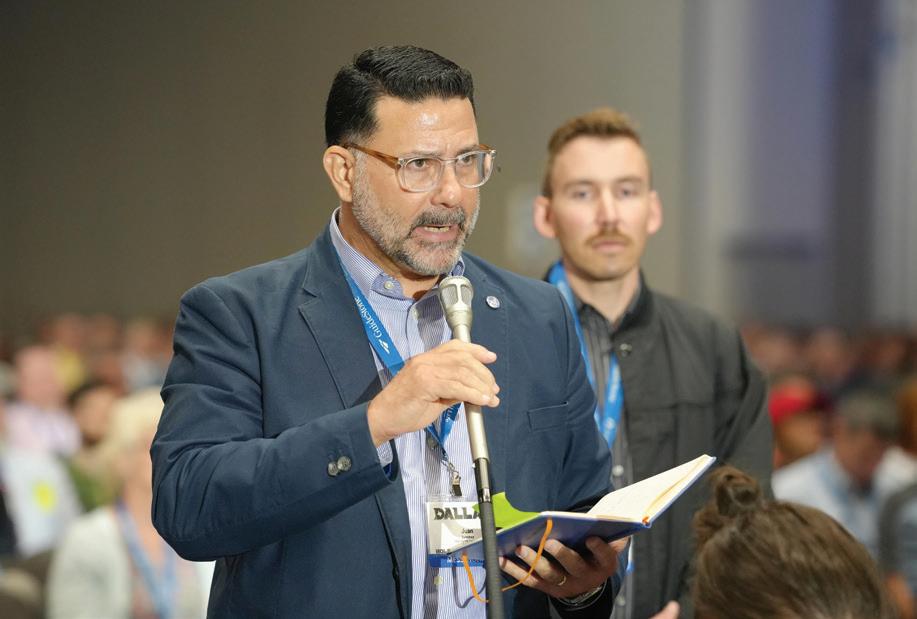

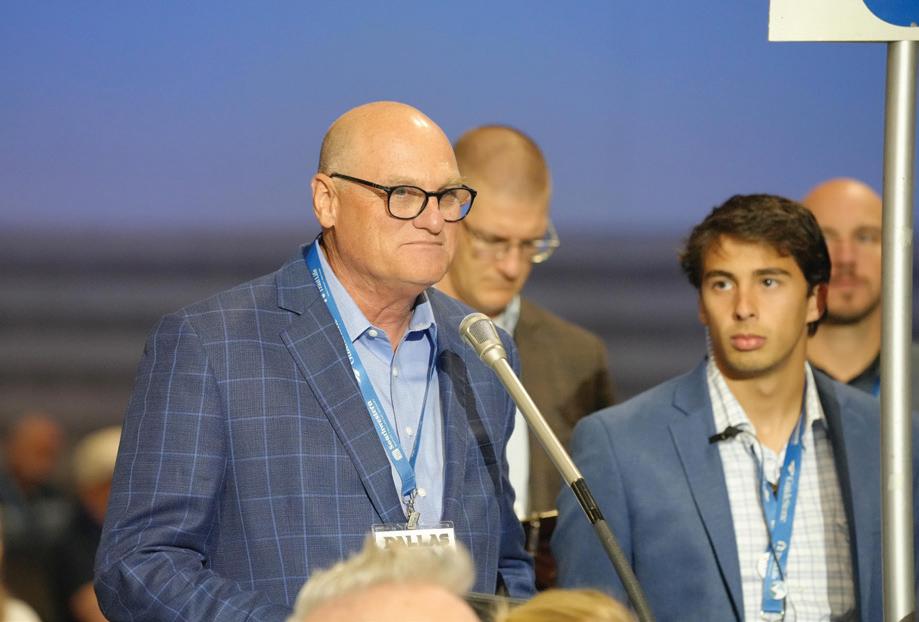
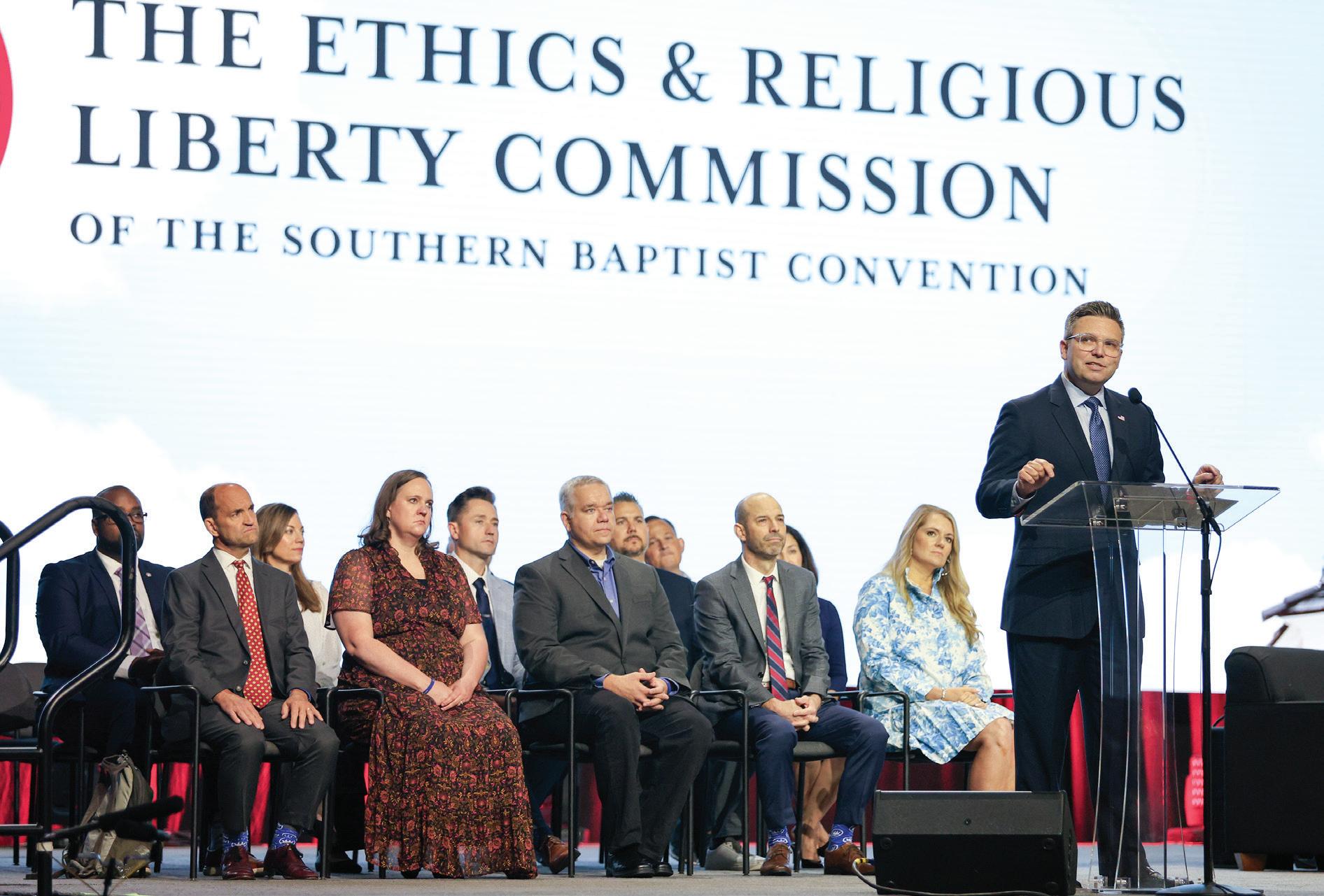
The vote came after the Law Amendment, which failed in its second reading last year, was brought back to the floor. Its resurrection was ruled in order by the chair, and the Committee on the Order of Business scheduled it for the last session of the convention.
The amendment, now carrying the name Sanchez/Law Amendment, sought to make the wording of the SBC Constitution Article 6 match the wording of the Baptist Faith and Message, which was amended last year.
Austin, Texas pastor Juan Sanchez spoke on behalf of the amendment, saying it would provide needed clarity for the Credentials Committee, which has responsibility to determine whether churches are in friendly cooperation with the SBC, or in violation. In this case, the violation would be to allow women to hold the title pastor that are reserved for men in preaching and pastoral leadership.
“This is the time to clarify what we believe,” Sanchez said. “We are not a people who are governed by attorneys. We are people who are ruled by a book.”
Executive Committee President and CEO Jeff Iorg spoke against the amendment, as he did last year. Iorg said it would give attorneys additional fodder for lawsuits if the language about pastoral qualification were moved to the Constitution. “There is no real doctrinal division here,” Iorg countered, as the Baptist Faith and Message has made the position clear.
“Removing this standard from theologians and pastors and giving it to attorneys and insurance companies” would be the outcome of approval, Iorg explained, and subject future credentials committees to additional lawsuits.
In about 15 minutes of floor discussion, messengers debated the legal merits of the amendment rather than theological positions over women in ministry. Missouri messenger James Goforth described the action as overreach, calling it “a bridge too far.”
By nearly the same 60% majority as 2024, short of the two-thirds required, the motion to codify the SBC constitutional position on the male-only qualification for pastors failed again.
The SBC’s public policy entity turned away another attempt to abolish it. The vote was close, with Pressley opting for a paper ballot over the usual lifted-ballot book vote. The vote was 3,744 (56.89%) to retain the ERLC, and 2,819 (42.84%) to abolish the entity that has roots dating back more than 100 years.
The pastor who brought the motion argued that the two successive votes required to abolish an entity would give the beleaguered ERLC a year to correct its actions. But, Willy Rice of Calvary Baptist Church in Clearwater, Florida said, he didn’t believe that would happen. “For too long the ERLC has caused confusion and division for our churches,” Rice said. The voice of Southern Baptist beliefs to public officials has instead “become a conduit for the culture to speak back to us (the church).”
“The facts are clear,” Rice said, “the trust is broken.”
ERLC President Brent Leatherwood used his entity report time to defend the current work of the ERLC. Leatherwood denied that he has become a lightning rod.
“It’s not about me. It’s not about those who came before me,” Leatherwood said in a video, referring to his predecessor Russell Moore. “We are closer to the churches now than we have ever been.”
Leatherwood pointed to the ERLC’s work on prolife issues that has been part of his campaign to reconnect, rather than the political issues, including immigration, that distanced Moore from the base.
Former ERLC President Richard Land rose to the ERLC’s defense. He called it “particularly tragic” to contemplate abolishing the ERLC when the entity has more opportunity with the current leadership in Washington “than in my lifetime.” He pointed to Congress members as allies who are “trying to turn back the barbarians at the gate in our culture.”

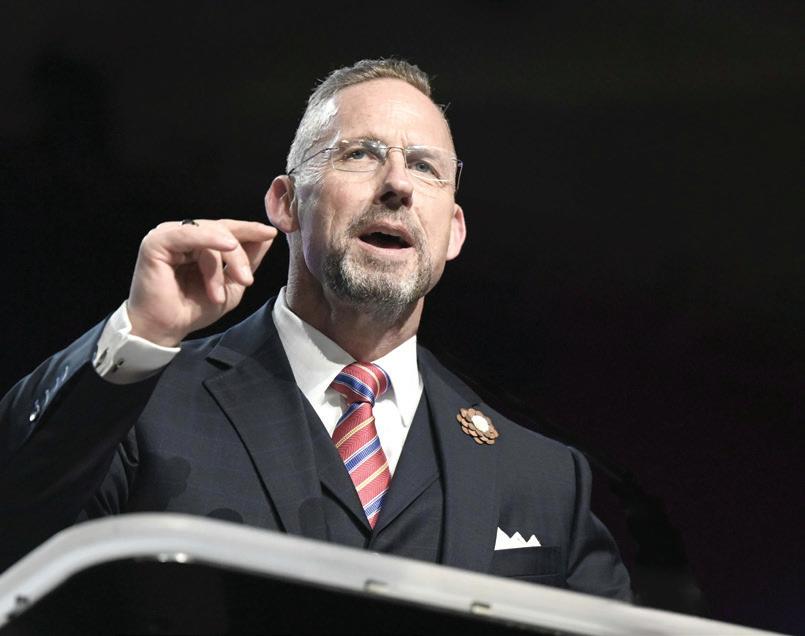
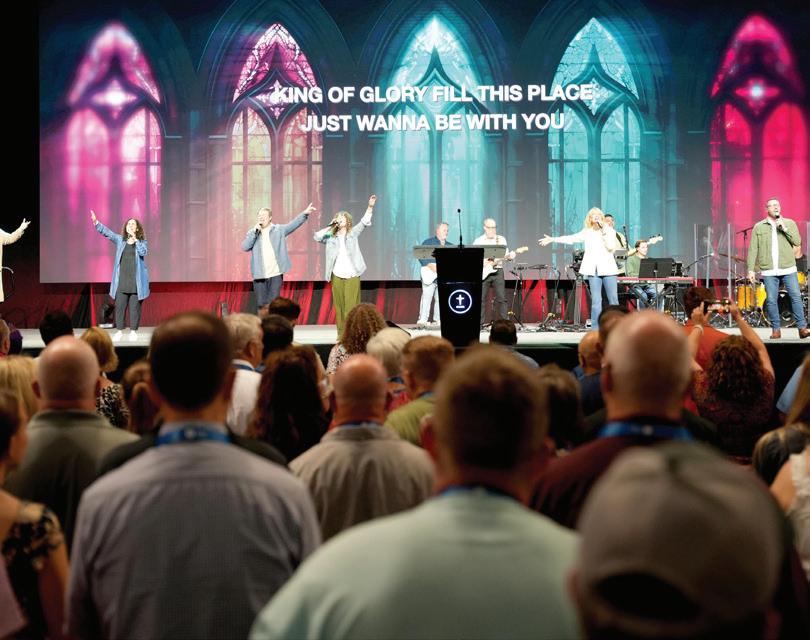
Land concluded, “This is a particularly strategic moment.”
ERLC Board Chair Scott Foshie, an IBSA employee who began serving as a trustee while a pastor in Steelville, led the defense prior to the convention after criticism by Southern Seminary President Al Mohler sparked the latest effort to defund the ERLC.
“Like every Southern Baptist church and entity, the ERLC is not perfect and has seen its share of challenging days,” Foshie said from Dallas. “But there is no question the ERLC is a work worth continuing and improving. Your trustees are thankful for your feedback and good ideas, and we want to earn your trust.” Foshie was pleased with the outcome, but he said there is restorative work to be done.
Hunt, who himself has a defamation suit pending against the SBC Executive Committee. Hunt’s suit, that came out of claims of his sexual abuse of a pastor’s wife, was postponed from a trial date originally set in June. The SBC motion was ruled out of order.
The second was an attempt to bring to light alleged defamation involving a pastor and some hallway discussion about handling of abuse claims that the pastor says were false. The messenger, Tom Buck of Lindale, Texas, wants an investigation to clear the pastor whose reputation, Buck said, has been damaged. But parliamentary limitations on what can be discussed in a public meeting that involves individuals and such allegations made it almost impossible to tell messengers what they would be demanding from their own Executive Committee.
Counsel for the EC is already involved in such an investigation, involving hallway security camera video of the conversation. The first motion was ruled out of order, but messengers agreed to bring it for a vote. Then, after explaining as much as possible, that vote failed.
Transparency and the Iorg effect
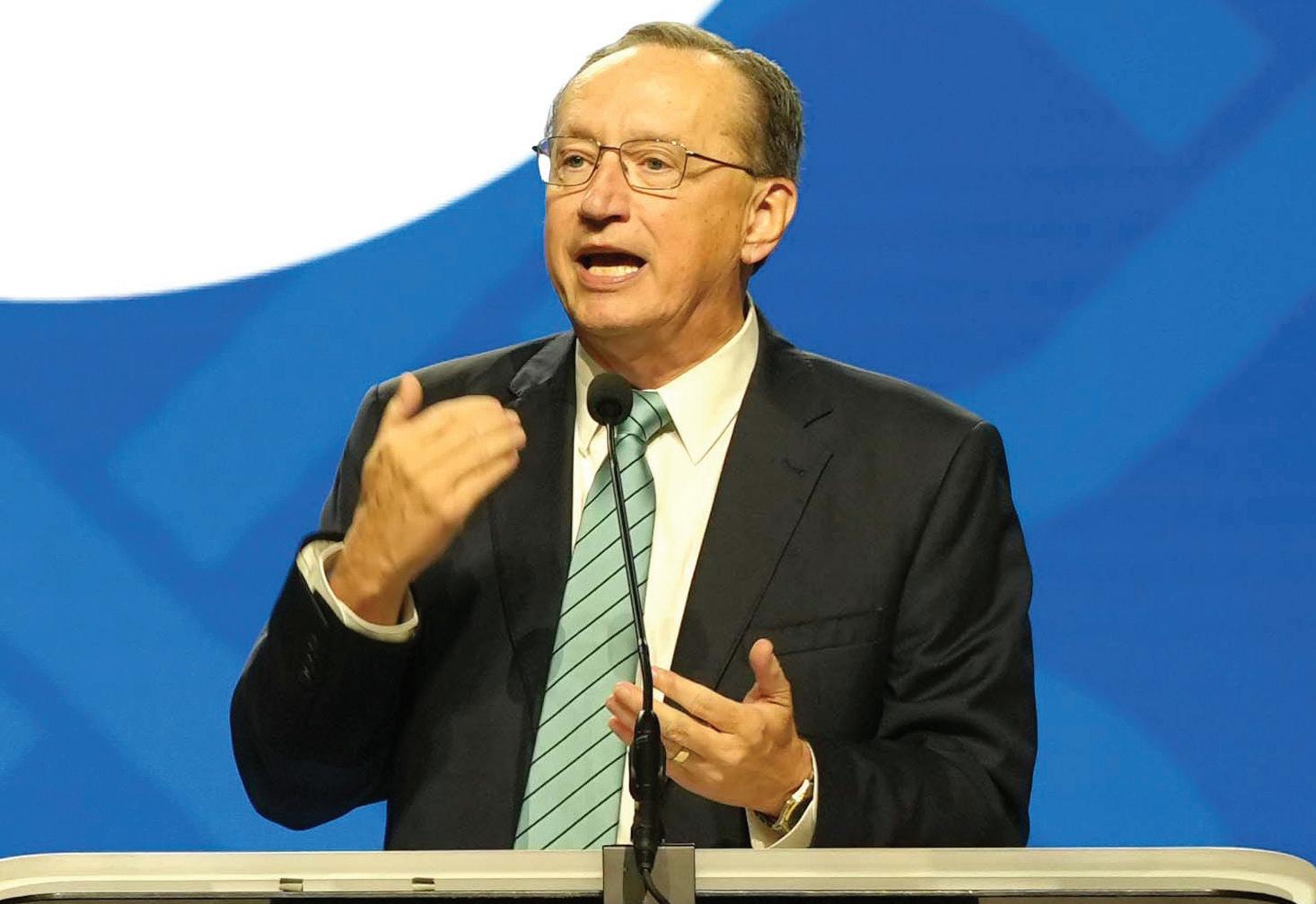

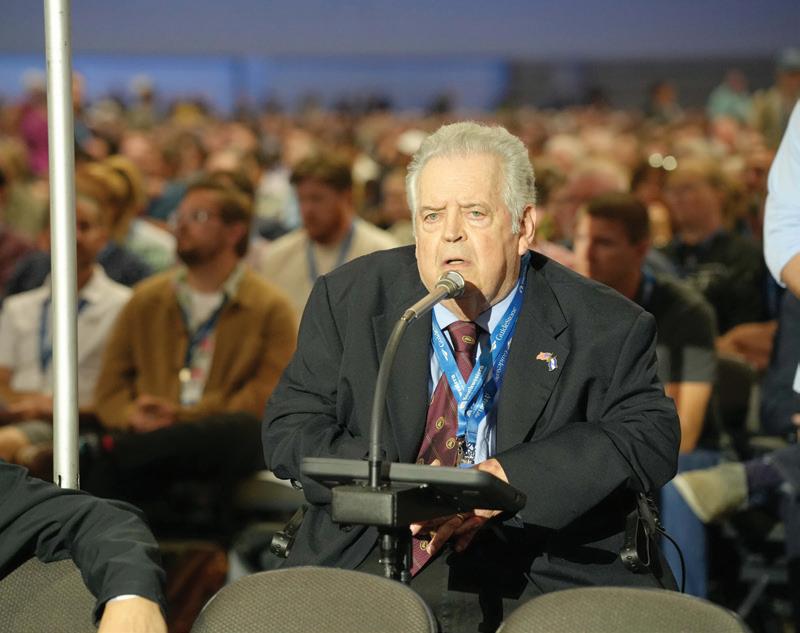




Without floor debate, messengers passed a 202526 SBC operating budget of $190 million that allots $3 million for legal expenses. At the time it was proposed in February, there was much criticism about utilizing CP funds, implying missions dollars, for lawyers. Coming into the meeting, some observers anticipated arguments over the revision of the business and financial plan, with funding for ongoing legal expenses. But EC President and CEO Jeff Iorg said at the time there was no other way to pay for representation when the SBC is sued. “We are the defendants in these cases,” he said, not the plaintiffs.
Iorg was even more direct in his EC report. “As long as there are legal issues in the churches, there will be misplaced lawsuits naming denominational entities. And remember, in all these cases, we are defendants, not the initiators of these legal actions,” Iorg said.
“The good news, and it is good news, is we are making steady, incremental progress at resolving them,” Iorg said. “The bad news is the cost of completing the task is unpredictable.”
Iorg pointed out the Department of Justice investigation into EC handling of sex abuse claims was closed without DOJ action. But, he laid the financial loss of $12 million to abuse claims and legal representation at the feet of his predecessors in leadership. The Convention is paying for bad decisions from just a few years ago, mostly tied to the waiving of attorney-client privilege in the early days of the Guidepost Solutions probe of abuse claims and how they were handled by SBC leaders, including then EC President and CEO Ronnie Floyd.
Downsizing the EC staff by one-third helped, Iorg reported. Again he said that sale of the SBC Building in Nashville is one way out, but there are no offers on table for the pricey downtown offices. Budgeting for lawyers is another way out. Messengers voted for the budget without complaint.
For those looking for signs of unity in the SBC, nearly identical votes on key issues of theology and polity two years in a row may be a signal. Willingness to pay for legal help to put the troubles of the recent past behind us is another.
Two motions related to sexual abuse were made, but both failed. One was a motion to order a countersuit against former pastor and North American Mission Board (NAMB) vice president Johnny
Pressley presided over the convention with a firm hand but a kind spirit, keeping the arguments corralled. He relied heavily on the two parliamentarians standing behind him for guidance on procedures and calls on the outcomes of voice votes, in this case the upraised yellow ballot booklets.
But it was Iorg whose few platform appearances seemed to carry the most weight. Appearing at his second annual meeting as head of the SBC’s Executive Committee, Iorg spoke directly to pending motions and amendments that involved finances or possible legal actions. He didn’t appear to be telling messengers what to do, but the longer-term implications of their votes. Iorg’s positions carried the day in all cases.
Financial transparency is one example. Motions requiring extensive financial reports from SBC entities, including salaries and bonuses of top executives, are a recurring proposition in recent annual meetings. Messengers who want to know the details of SBC entities and one mission board in particular want “form 990-level reporting.” That’s an IRS requirement of corporations that is not required of religious institutions.
Iorg spoke against the motion, saying it would not achieve the level of transparency some messengers want, and it could also jeopardize the entities by utilizing an IRS form that is not yet required by law. Iorg’s new business plan includes measures aimed at financial transparency and reporting by all entities.
After floor arguments whether a billion-dollar denomination can be operated exactly like a hometown congregation, messengers sided with Iorg and voted down the “form 990” motion. And after rancorous years where SBC leadership was questioned and doubted, it appeared Iorg is leading the effort to rebuild trust.
An Oklahoma messenger asked Gateway Seminary President Adam Groza (bottom left) following his report:
“President Groza, my question is, and I think I speak for all of us, What product do you use in your hair?”
Tongue in cheek, Groza directed him to the seminary website, where “you can learn a lot about what we do. A lot, but not everything.”




The Cooperative Program was revolutionary at its beginning, and it remains so today, as Southern Baptists have chosen to give a portion of their tithes and offerings to missions through the unified giving plan to send missionaries, start churches, educate students, and strengthen churches, near home and around the world.
Messengers in Dallas celebrated the 100th anniversaries of CP and the Baptist Faith and Message, both adopted in 1925, along with the Baptist Annuity Board, today’s Guidestone Financial Services.
SBC President Clint Pressley identified CP and our statement of faith as the two rails our mission advance runs on. In IBSA parlance, our Executive Nate Adams describes them as the twin pillars that have held up our work for a century.
In Dallas, leaders from across SBC life spoke of the rich history and pressing future need of the Cooperative Program, backed by a platform packed with state convention executive directors, SBC entity presidents, and ethnic fellowship leaders, and more.
Executive Committee President Jeff Iorg compared CP to memorial stones in the Old Testament.
“Joshua told the people, In the future, when your children ask you, what do these stones mean? You should tell them; the water of the Jordan was cut off in front of the ark of the Lord’s covenant.” Throughout this convention, we are erecting memorial stones of 100 years of cooperation demonstrated through the Cooperative Program.
“This is what God can do through a people who
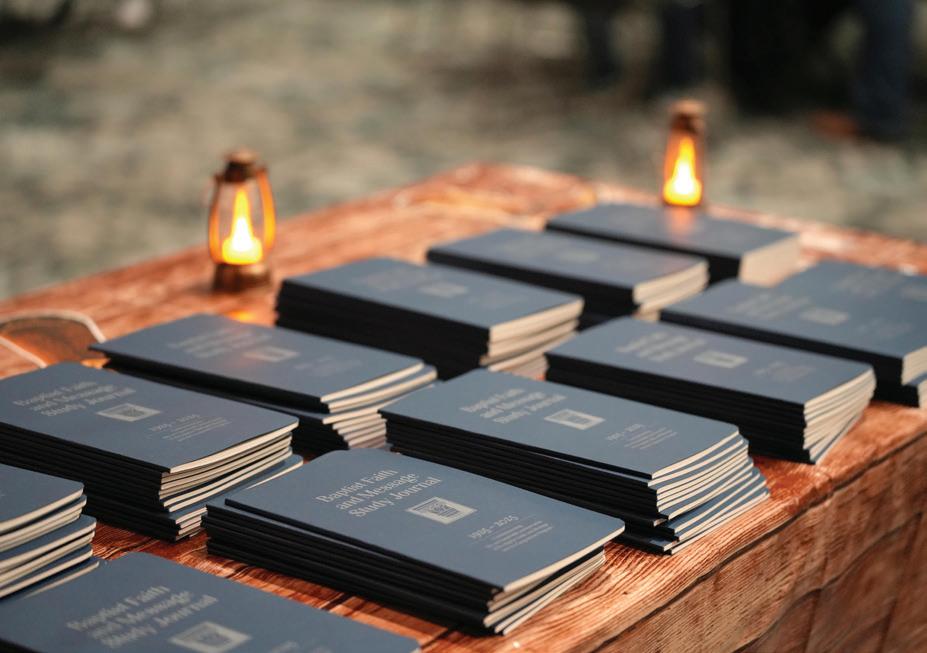
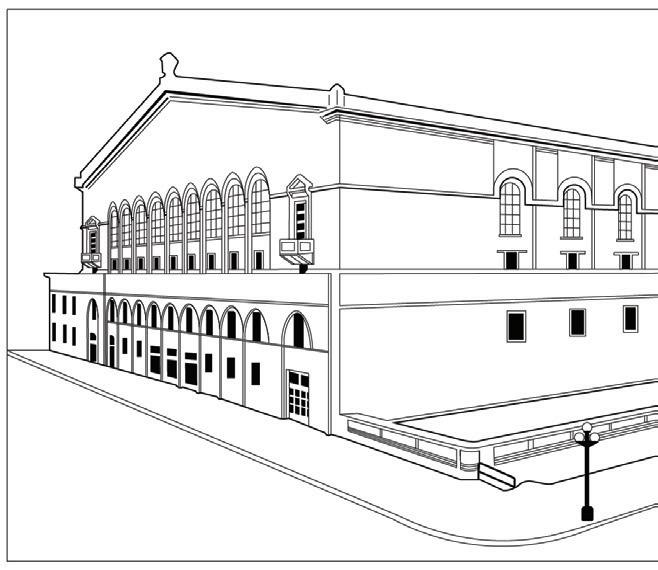
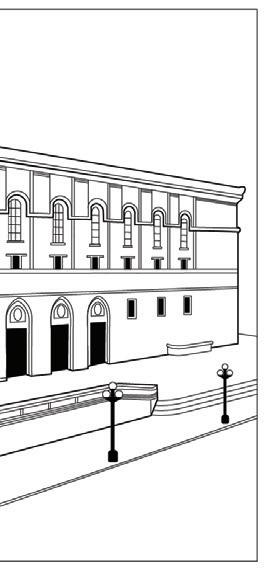
cooperate together. We build this memorial so we can challenge our children and our grandchildren to resist the temptation to go it alone and to discover the incredible power of voluntary cooperation.”
Taffey Hall, Director and Archivist at the Southern Baptist Historical Library and Archives, pointed out that messengers 100 years ago faced difficult days, but the impulse toward evangelism and missions compelled them to move forward together.
“Historically, trust has always been a factor in Cooperative Program giving. Southern Baptists need to trust that when they put their money in the offering plate that goes to the Cooperative Program, that those funds are spent efficiently, and wisely, and for the right causes.
“Now, just as our Baptist forerunners from the 1920s accepted that challenge, it’s up to us to renew that commitment,” Hall said, “because when we don’t work together the gospel retrenches, but when we do work together, the gospel advances.”
Dan Spencer, Pastor of First Baptist Sevierville, Tenn., and great-great nephew of M.E. Dodd, one of the 1925 catalysts of the Cooperative Program, shared words written by his “family hero.”
“Our entire denominational Cooperative Program is one. It is not to be looked upon in segments with each worker over in a corner attending to his own little job entirely apart from the others,” Dodd wrote. “They are not competitors, but cooperators in a common cause. What helps one, helps all. What hurts one, hurts all. They must all stand or fall together.”





Four men were seated on the platform at the centennial presentation for the SBC’s statement of faith.
They were seminary presidents Al Mohler and Chuck Kelley, former SBC president Fred Luter, and former head of the Ethics and Religious Liberty Commission Richard Land (l-r in photo right). They were all members of the committee that revised the Baptist Faith and Message.
If 1925 was a pivotal year in Southern Baptist life, so was 2000, as the convention entered a new era with its arguments over the nature of Scripture mostly ended, and its doctrine clarified to face into the cultural headwinds.
“Let us hold fast the confession of our hope, without wavering, for he who promised is faithful,” SBC President Clint Pressley said at the celebration, quoting the Hebrews 10 theme verse. “That is my prayer… that we would not only be glad (for) a century of grace, but we would pray and hold on to this confession in the generations to come.”
Mohler briefly traced the faith statement back to predecessors two centuries earlier, but he pointed to 1925 as a turning point.
“At that point you had the high-water mark of the fundamental-modernist controversy. You had theological issues that were simply dividing peo-
ple… issues as basic as the authority and inspiration of Scripture, the inerrancy of Scripture, the validity and reality of the virgin birth and the necessity of the one atonement. All these things were part of the theological controversies of the age.
“And Southern Baptists had to take a stand… And they didn’t come up with a completely new confession of faith. They went back to the New Hampshire confession, one of the most familiar and… classic Baptist confessions of faith,” Mohler said, and clarified their doctrinal views.
“Over the years, Southern Baptists have faced additional controversies. No surprise there. That’s just the way of the world. We’re living in a modern age in which you have doctrine after doctrine questioned, truth after truth challenged.”
With its statements on marriage, family, and gender made 25 years ago, the BF&M seemed poised for the future. For today.
“We’re going to say to the watching world, this is what we believe,” Mohler said. “These are the truths we believe. This is what we preach. This is what we stand for. And it’s good on this 100th anniversary that Southern Baptists come back and say, we stand on what we say.”
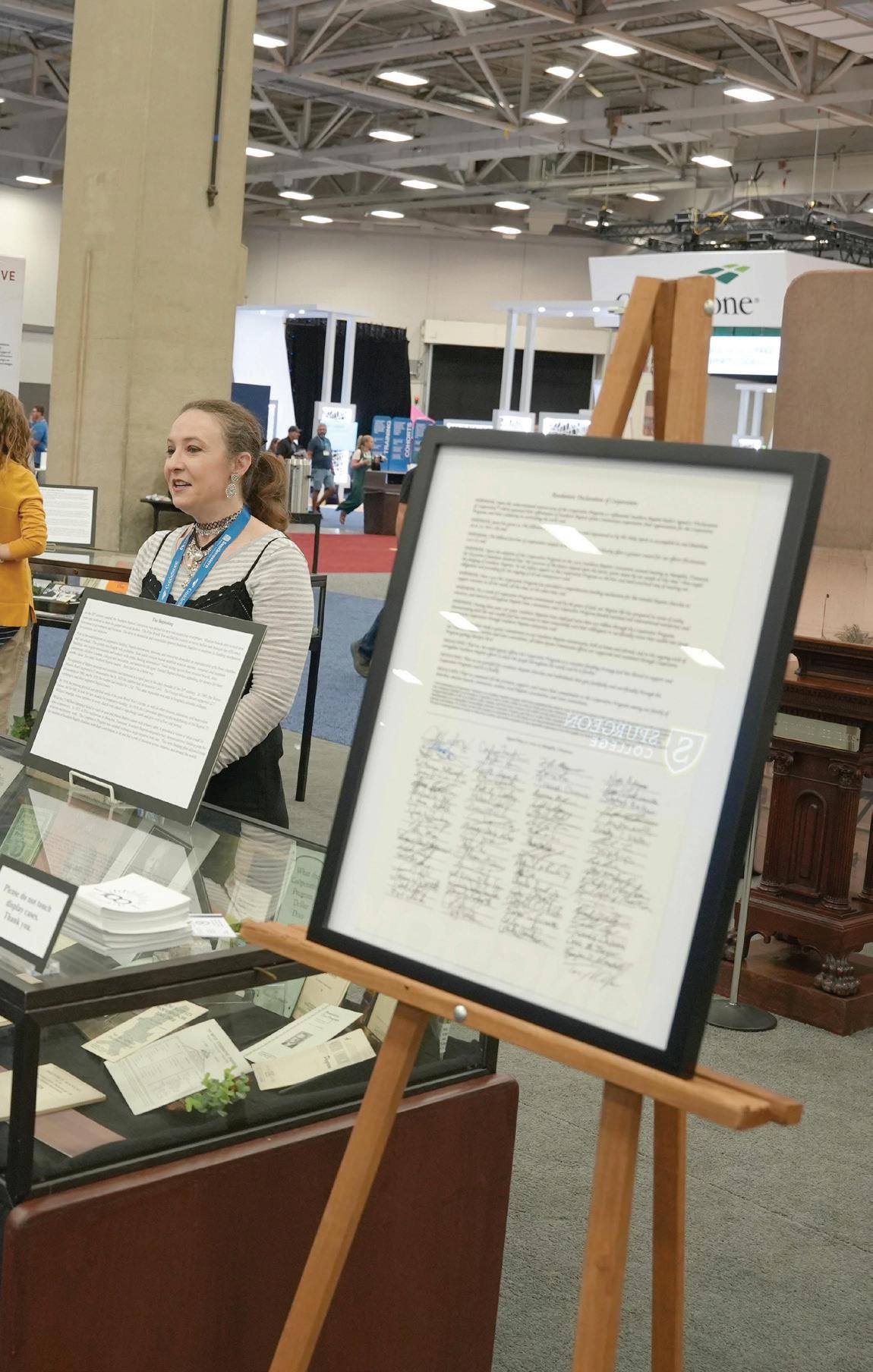
HISTORY LESSONS— Messengers concluded the anniversary celebration by adopting Resolution 2, “On the Centennial Anniversary of the Cooperative Program.” This was the same resolution signed by 73 Southern Baptist leaders in Memphis on May 13.
A framed copy in the exhibit hall was alongside display cases of Southern Baptist historical artifacts curated by Taffey Hall (above). She stood there throughout the gathering, chatting with messengers about SBC history.
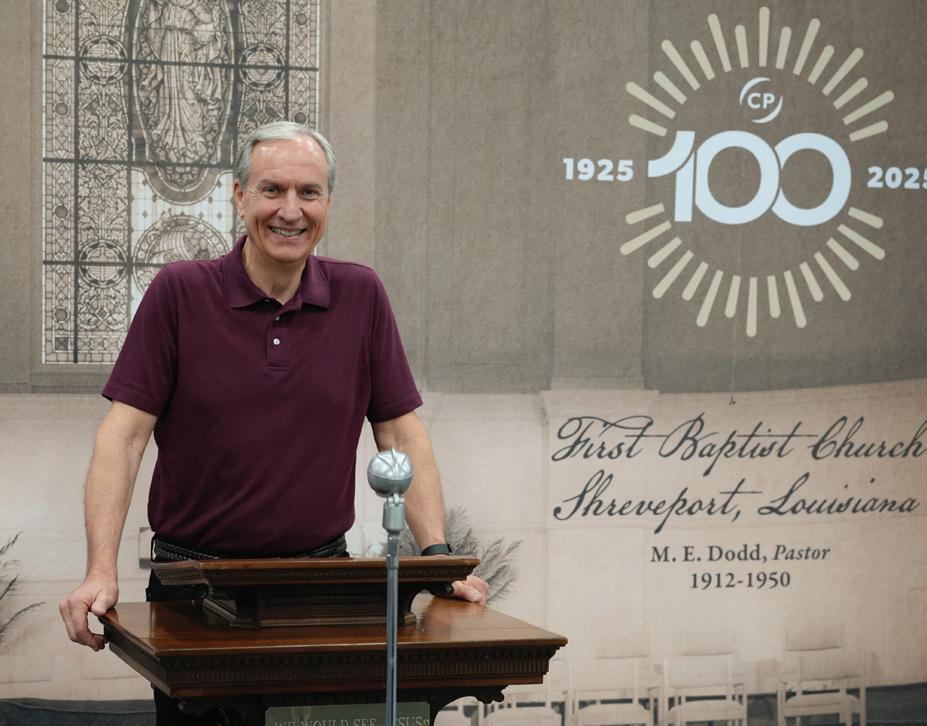
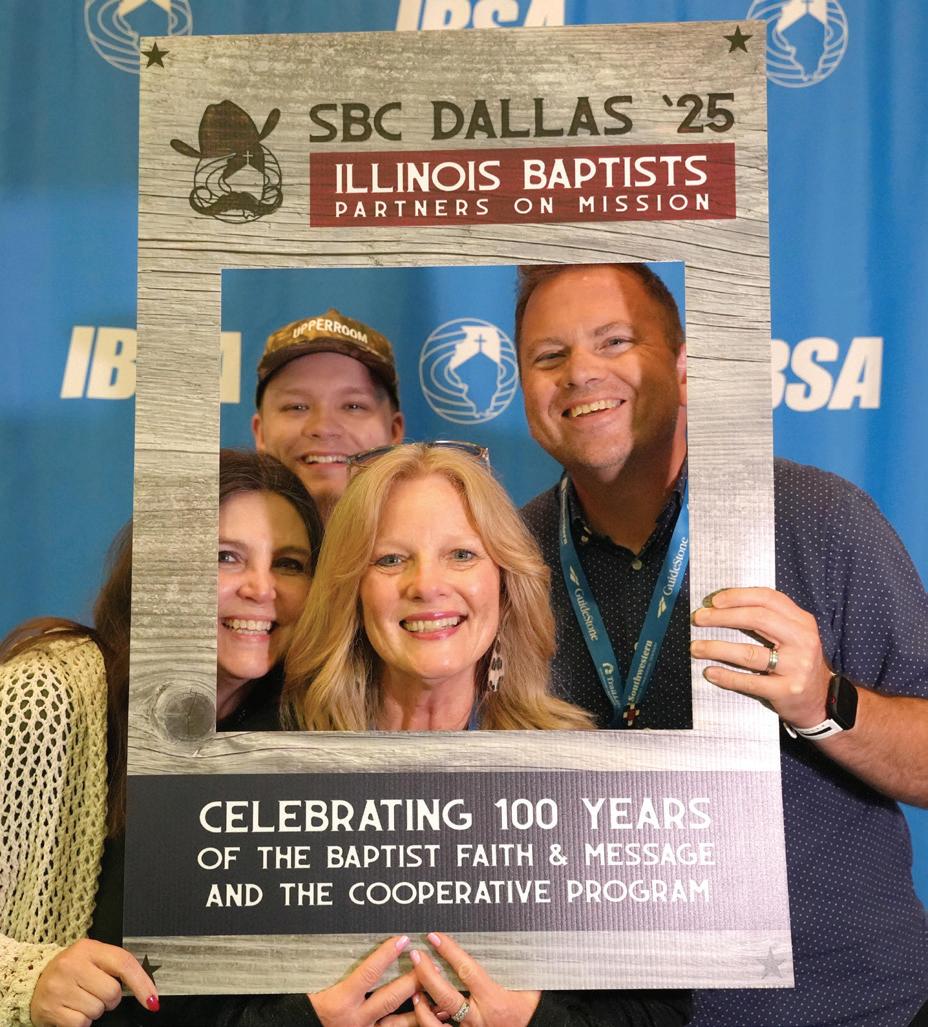
This historic resolution will be made available online for all Southern Baptists who choose to sign digitally “as an expression of (the) unity of purpose and consecration” exhibited by messengers Dallas.
Also in the exhibit hall was the pulpit of M. E. Dodd, which was used May 13 in Memphis for signing the resolution. IBSA Executive Director Nate Adams stood behind it again in Dallas. Illinois Baptists also took photos with the CP Frame to put themselves in the picture for CP’s next 100 years.
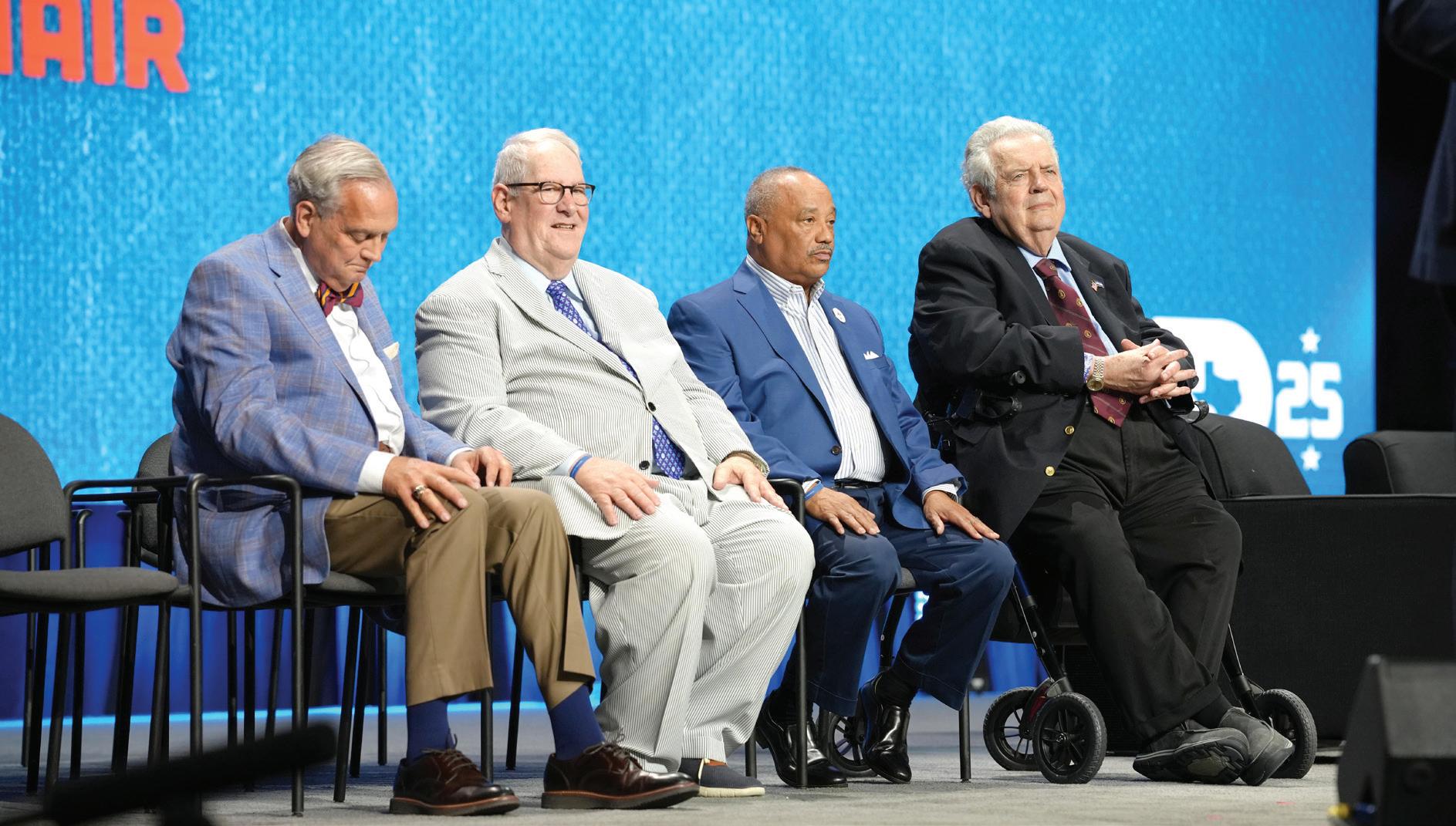
(Editors note: Tony Wolfe, Executive Director of South Carolina Baptists, co-edited book, A Unity of Purpose, celebrating the centennial. He also preached the Convention sermon. Here are some highlights.)
Growing up in Baton Rouge, Tony Wolfe fished along the banks of smaller rivers near the broad Mississippi. “As kids, we never thought much about how the River got so big. We just kind of acknowledged that it was massive and powerful.”
From Eccles. 11:1-6, “cast your bread upon the waters,” Wolfe drew comparisons to the force of cooperative giving. “We send our bread on the surface of the waters, sacrificially and joyfully together, because when we do, wherever it is needed most, there we know after many days we may find it.”
While Wolfe acknowledged there are things that frustrate him about our cooperative work, he does

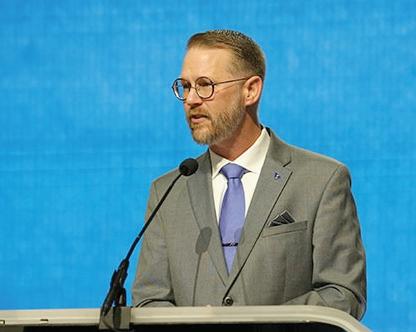
not let them distract him. “Because my message is too urgent, my mission is too clear, and my time is too short to waste a single day staring at the clouds or overanalyzing the winds,” he said.
“The Cooperative Program is not about what we can do, as much as it is about what God does in and through us,” Wolfe said. It is an intergenerational testimony to God’s supernatural activity through Baptists’ sacrificial harmony.
“For generations, God has been pleased that through the Cooperative Program, the gospel has floated along the river to the nations. Churches have sent bread, God has brought rain, trees have been moved, and people all over the world have found the lifegiving sustenance of the gospel of Jesus Christ sprouting up in the darkest and dryest of desert places.”
Wolfe asked messengers to consider not only how CP has become “such a powerful force in advancing the Great Commission,” but the “depth of Cooperative Program engagement that by God’s grace” lies ahead.
In the next 100 years, may God be so pleased that innumerable multitudes among our neighbors and the nations downstream from us today will come to know Jesus Christ, the Living Water and the very Bread of Life, through the generous sowing and sending of Southern Baptists right now, in our day,” Wolfe answered.
“Our commission is too clear, our message is too urgent, and our time is too short for anything less.”
Ft. Worth | “I am one of Tully’s kids,” Sandy Wisdom-Martin said. “WMU missions camps helped me understand there was something beyond my tiny church in southern Illinois. Evelyn Tully taught us to love the nations, lead by serving and to follow God in unwavering obedience.”
Her salute capped the WMU Foundation 30th Anniversary Celebration in Fort Worth June 7, as Illinois’ very own Evelyn Tully was honored with the 2025 Rosalie Hunt Devoted Patron Award. About 150 people attended the barbecue dinner.
“The annual presentation recognizes individuals who, like Hunt, have demonstrated unwavering commitment and extraordinary generosity in support of the WMU Foundation,” said WMU Foundation President Peggy Darby as she presented the award. “Their investment in missions education, discipleship and the ministry of WMU ensures that the gospel continues to reach lives across the globe.
“Evelyn Tully exemplifies the heart of this award,” Darby said. “Her life reflects the spirit of Rosalie Hunt — devoted, visionary and wholehearted commitment to missions for life.
“She is not only a catalyst for others, but also a committed, consistent donor.”
In accepting the award, Tully shared how her love
for missions began in childhood—listening to her mother read from the missionary prayer calendar and tracing countries on a world map on their wall. Eventually, Tully served as GA (Girls in Action) and camp director in Illinois before becoming the first national Acteens consultant.
Tully also coordinated a four-year missions partnership between Illinois WMU and Baptist women in Kazakhstan, including their first countrywide women’s gathering. “A highlight was the first countrywide gathering of Kazakhstan Baptist women,” she said. “They came by bus, van, train—some walking several miles.”
In honor of her service, and at the time of her retirement, Illinois WMU leaders established the Evelyn Tully Endowment for International Women’s Conferences, which continues to support women’s gatherings for leadership training and spiritual growth across six continents.
Tully helped launch the inaugural National Acteens Conference in 1972 with the theme “Let God Happen,” which featured missionary guests Rosalie and Bob Hunt, who were serving in Taiwan at the time.
“Receiving this award named for Rosalie Hunt is a tribute to relationships formed through the years,” Tully said, noting she and Hunt recently had exchanged messages about the honor. “It’s nice this all fits together for tonight.”
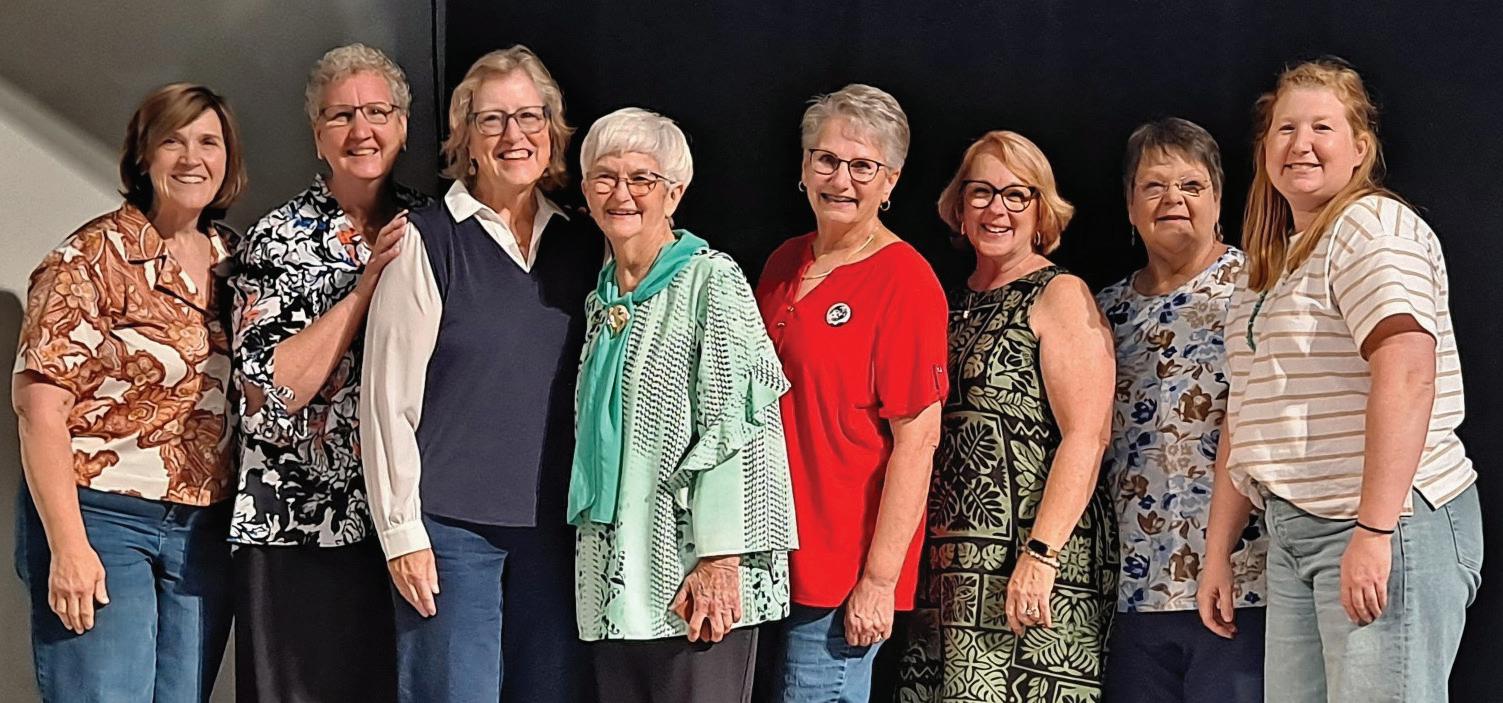
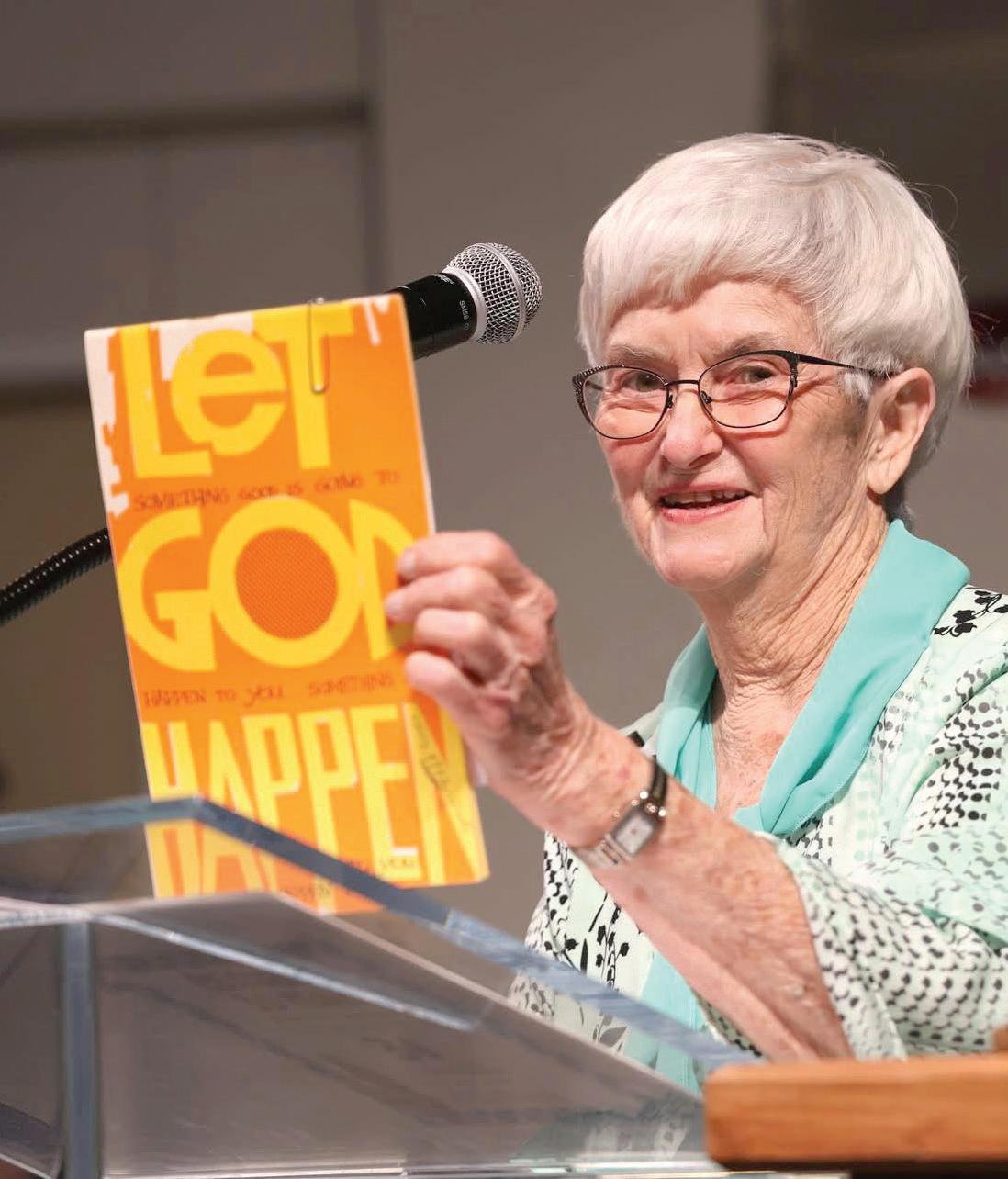
“I pray you will choose Missions for Life. We can all do so much through Woman’s Missionary Union through Baptist churches. Let’s continue to do that.”
Wisdom-Martin, who grew up in Southern Illinois and frequented Tully-led camps at Lake Sallateeska, is now executive director of national WMU. She closed the evening with a special message to Tully. “You taught us to love camp, and camp taught us to love WMU, and WMU taught us to love the peoples of the world, and loving the peoples of the world taught us to take our place in God’s plan.”

‘Choose Missions’
“I thank God for revealing to me, the plan for my life — serving through WMU,” Tully said. “WMU challenges us to commit to ‘missions for life.’ Since the beginning of the WMU Foundation, I have supported numerous funds and endowments. My estate will continue that support beyond my life.”
IBSA Executive Director Nate Adams joined the praise of Tully’s work after the Texas event. “Evelyn Tully has had a deep and lasting impact on both the missions education and missions engagement of Illinois Baptists. As an IBSA staff member for many years, she invested in the development of countless church and missions leaders, and especially girls and young women,” Adams said.
“Evelyn has continued her zeal and effective ministry in so-called retirement, especially through WMU and the WMU Foundation. We are proud to call her an Illinois Baptist, but her life’s impact extends around the world and into eternity through the lives she has touched.”
—reported by Jennifer Davis Rash in Fort Worth
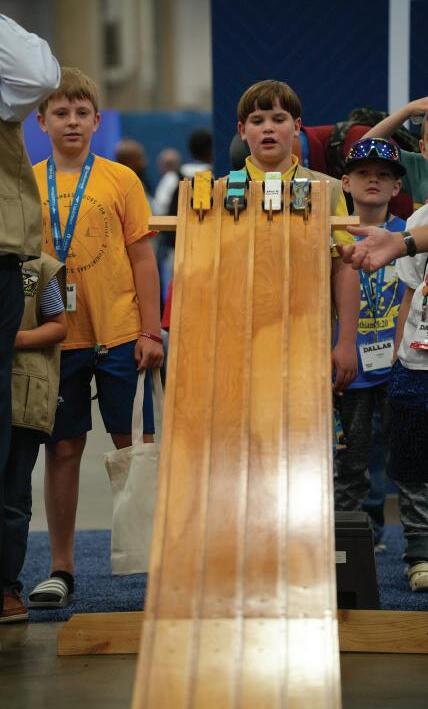
Thomas Howard, age 11, from Casey was a competitor in the Royal Ambassadors (RA) Pinewood Derby race in Dallas. He was one of the competitors at the annual race of hand crafted model cars sponsored by the Woman’s Missionary Union (WMU). At the SBC exhibit hall kids, SBC entity heads, and state WMU directors all battled it out for the top spot in their corresponding categories.

Among 11 participants in the RA National Championship, Howard is the son of Pastor Brent and Holly Howard. The Howards have only been in Illinois since November when the elder Howard was called as pastor of First Baptist Church of Casey. In their previous home, Texas, Thomas and his older brother Danny competed in RA pinewood derby
races.
While the fourth grader didn’t win this year, his father said, “He had a good time with it. The excitement of it all is pretty cool. It’s fun just to watch it and put it [the car] on the track.”
Brent enjoyed the races too. “It was fun to see some of the leaders in the convention remember back to when they were kids,” he said.
Louisiana sixth grader Callen Breaux won the RA National Championship. Christine Gill of Louisiana Baptist Convention won in her catego-
The


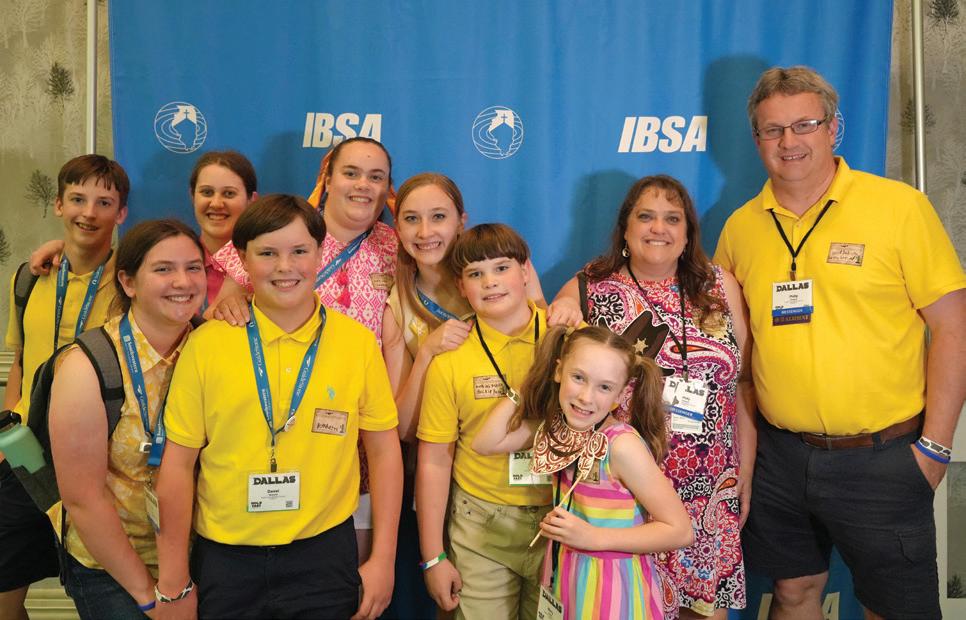
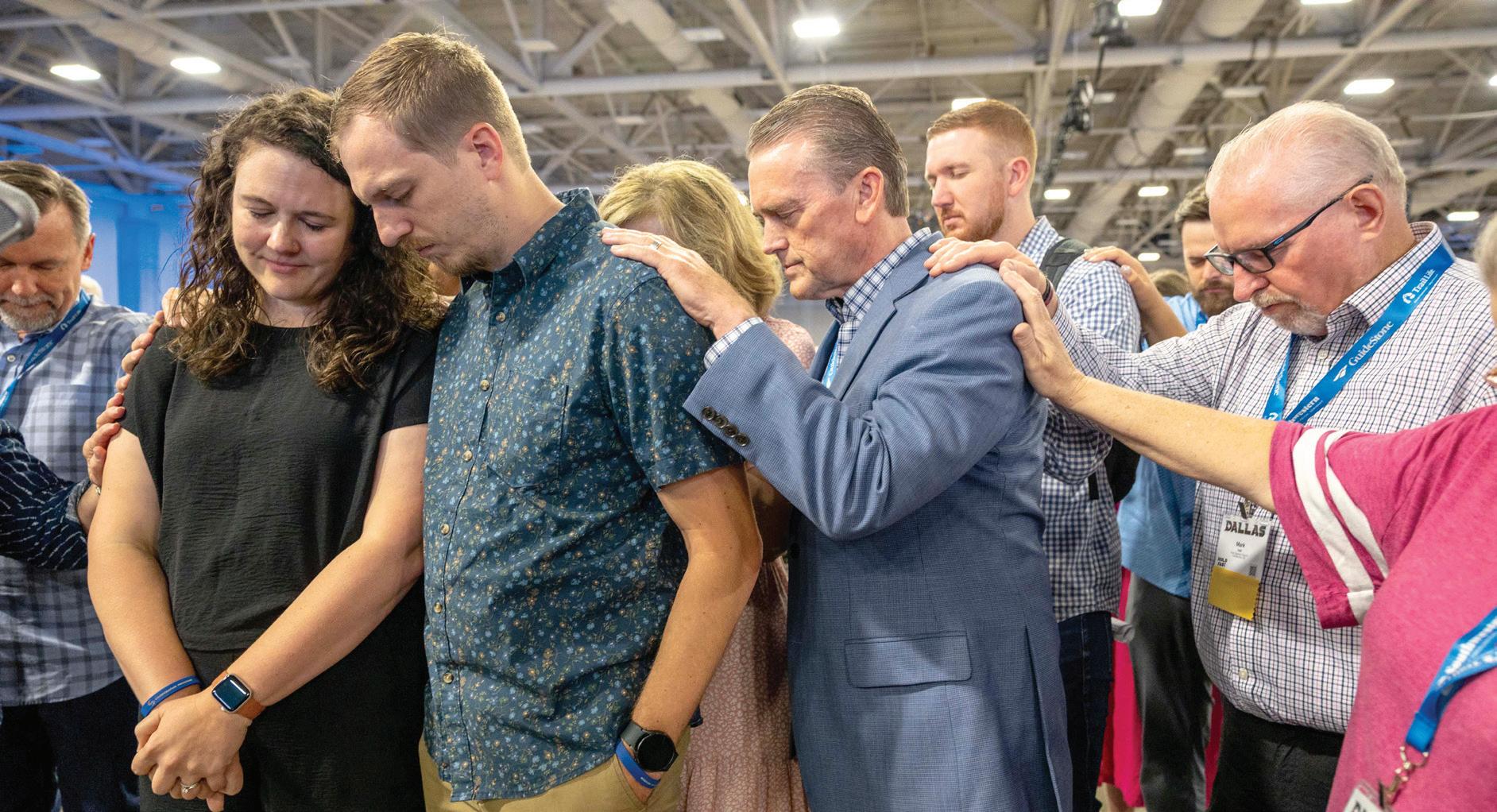
The SBC’s mission sending agencies delivered their reports to messengers in Dallas. International Mission Board (IMB) President Paul Chitwood brought greetings from the agency’s more than 3,500 missionaries serving in 155 countries.
“Through these relationships, God is moving,” Chitwood said. “Over the past year together, we went to the nations.”
Southern Baptists gave a record-breaking $206.8 million through the Lottie Moon Christmas Offering in 2024. He expressed appreciation for Southern Baptist’s strong commitment to CP “to be used on the frontlines of missionary work. This kind of giving changes eternity…” Chitwood reported:
• 1.6 million people heard the gospel
• 145,000 professed faith in Christ
• 68,000 were baptized and discipled
• 84,000 new leaders trained
• 2,400 new churches planted
• 12,000 Southern Baptists partnered with IMB missionary teams on short-term mission trips
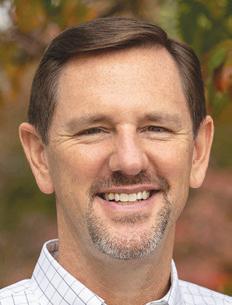
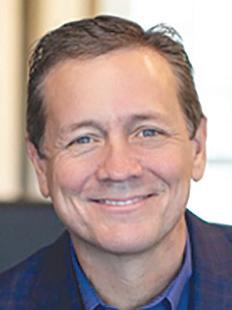
The IMB helped kick-off the SBC Annual Meeting with the celebration of 58 newly appointed missionaries, including 11 former Journeymen, during the opening session. Messengers gathered around the new missionaries, laid on hands and prayed, prior to their departure for training at IMB Headquarters in Richmond, Virginia, and then the mission field.
Those heading to regions hostile to missionary presence appeared behind a screen to protect their identities. One man, apparently from Texas, was silhouteed wearing a cowboy hat. Four couples spoke in their first languages of Italian and Korean, while English translations ran on the screens. Missionaries were united in their gratefulness for the prayers and generosity of Southern Baptists.
Chitwood illustrated with a examples including a young missionary mother receiving cancer treatments in Houston covered by giving through CP and Lottie Moon.
A missionary family wrote with thankfulness for the training that protected them when 12 men with machetes entered and robbed their home.
Missions back at home
“Pastors, your churches are making a real difference for the better in millions of lives,” North American Mission Board (NAMB) President Kevin Ezell
said. Last year, Southern Baptists gave a record $74.7 million to the Annie Armstrong Easter Offering.
“Our number one resource is the incredible people that God has allowed us to assemble on the NAMB team,” Ezell said. “Over 6,000 missionaries and chaplains are on the front lines, and we are grateful for how they serve, sacrifice, and faithfully share the gospel every day.”
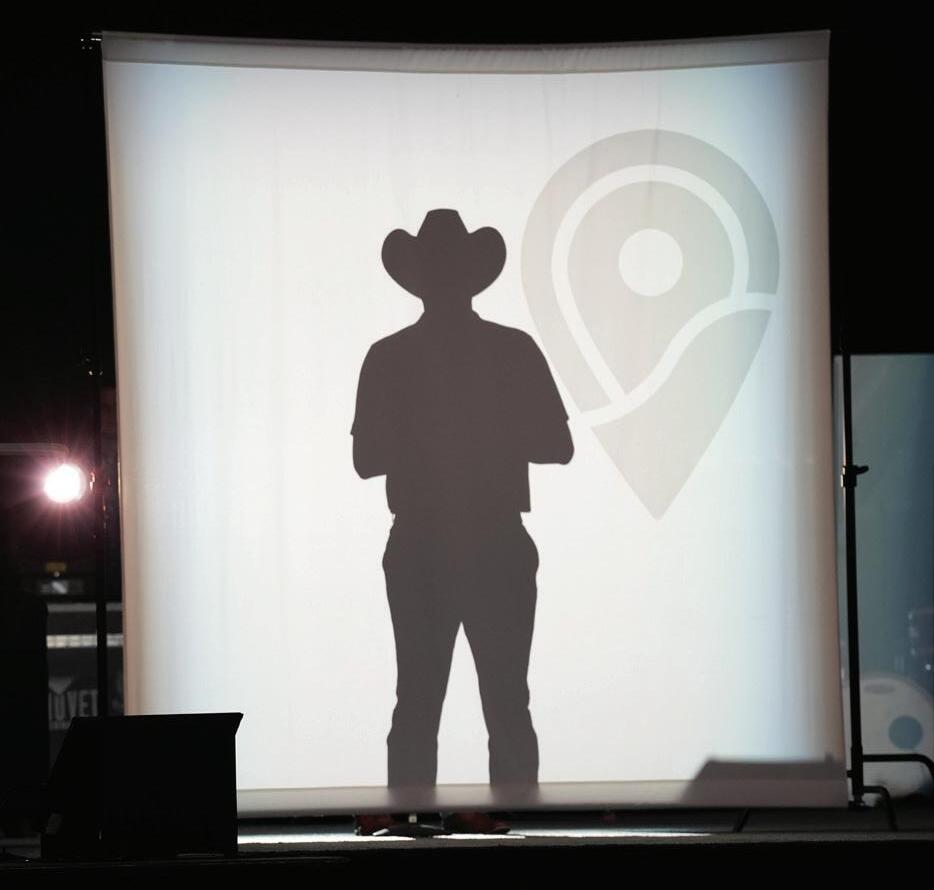
Ezell reported a 64% increase in baptisms and a 13% increase in new church plants.
Mark Clifton, NAMB director of church replanting and rural ministry, shared, “Of all reporting Southern Baptist churches, 88% have fewer than 200 members on a given Sunday.”
“You may feel small and insignificant, but remember you are not alone,” he said. “Most of your fellow pastors serve churches with very similar attendance and contexts. Focus on faithfulness.”
Send Relief is a five-year-old a collaborative global compassion ministry between the IMB and NAMB. In the past year more than 6,000 churches participated in ministry opportunities and 53,000 volunteers were mobilized through Send Relief. As a result, help and hope arrived reaching more than 2 million people and over 74,000 trusted Christ.
More volunteers were mobilized through 42 Disaster Relief state teams. “Those gold shirts and hats have been a visible sign of relief for just about every major disaster on the continent for decades,” Ezell said. “Southern Baptist Disaster Relief truly is the golden standard, but they’re not just known for rapid, massive responses. They’re known for carrying gospel-centered response.”
excerpted from Baptist Press

Groucho Marx once said, “If you find it hard to laugh at yourself, I would be happy to do it for you.” Although I have been accused of having a “resting serious face,” I also know the importance of having fun, especially together. So here are a few moments at SBC ‘25 that had us laughing with one another.
The SEND Luncheon
NAMB’s annual lunch event is always a hot ticket. It’s known for bringing inspiring and touching moments to the crowd of thousands. But this year also brought the laughs with a show from comedian, Michael Jr. His stories about life, like asking his grandma why a dead body was at church, or the front row prisoner named Moses (Let my people go!) had the room laughing, at the jokes and at themselves.
Adam Groza’s hair
As someone who is “follically challenged” I admire the fact that Dr. Groza, president of Gateway Seminary in California, uses his full head of hair to its maximum capacity. (See photo page 8.) The SBC loves it, too. His hair has become the subject of questions from the floor about hair-care products, memes comparing him to early 2000’s cartoon character, Jimmy Neutron, and even a brief parody account on X.
With only three minutes to pump up their candidate for one of the SBC’s elected officer positions, nomination speeches can be adjective-filled and fast paced. But this year, one nominating speech for recording secretary had an extra dose of humor. “There is no one more qualified to serve in this completely unnecessary role, than Dr. Nathan Finn,” his nominator and friend, Jay Adkins, said. “In fact, his dissertation titled “The Development of Baptist Fundamentalism in the South from 1940 to 1980” is evidence enough that Dr. Finn is gifted in the area of spending time on things that are unnecessary.” Messengers chuckled through all 180 seconds.
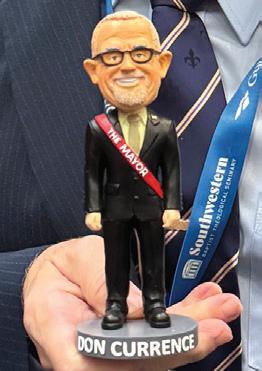
The Mayor’s bobblehead Don Currence has been a crowd favorite at the Convention for several years. The diminutive mayor of Ozark, Missouri was easily reelected to serve as Registration Secretary. EC President Jeff Iorg presented him with a Don Currence bobblehead—”life-sized edition,” Iorg said. “The Mayor” and about 10,000 messengers and guests, were thrilled at the hilarious moment.
Friends, after all
“Why can’t we be friends?” sang the 1975 funk band, War. I think this is what laughing together helps us achieve. A young pastor recently told me that to connect to SBC life and the Cooperative Program, he needed to feel that other pastors and denominational leaders were people he could be friends with. He needed to like them. Our mission is serious, but that doesn’t mean we have to take ourselves so seriously.
Ben Jones





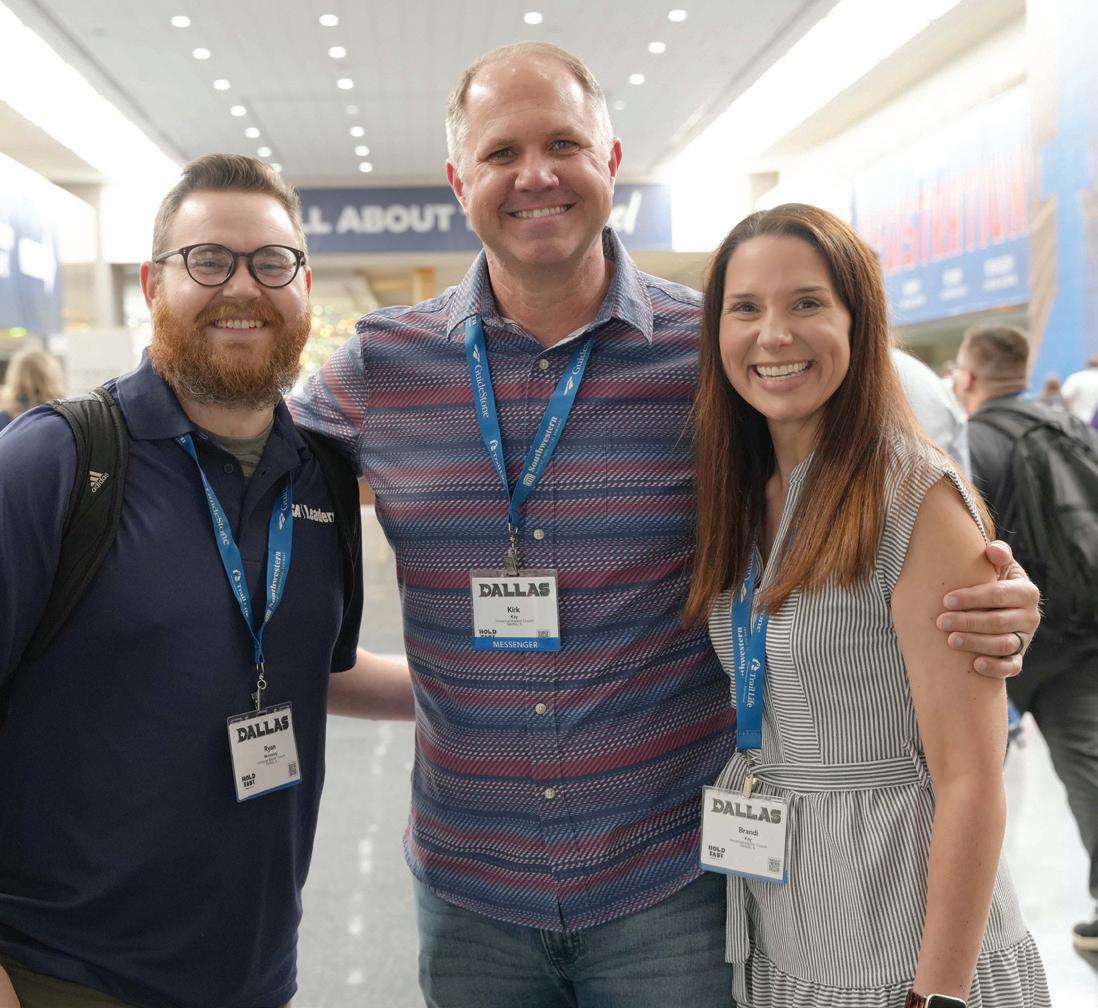
MEETIN’ TIME–


1. Messengers from Immanuel Baptist Church in Benton, Ryan Mulvaney and Kirk and Brandi Kay, stop for a photo outside the registration area.
2. Chicagoland pastors who serve just five miles apart, Bryan Price (Love Fellowship, Romeoville) and Bruce Kirk (Alpha, Bolingbrook), meet up in the Exhibit Hall.
3. Front row Baptists worship together. (l-r): Tammie Emerson, Lisa and Cliff Woodman, Mark Emerson, Michael and Victoria Awbrey.

ILLINOIS DOWN SOUTH–
4. Nate Mason (FBC Effingham) chats with Nate Adams at the IBSA Dessert Reception.
5. Illinois Baptist Women (l-r) Lindsay Wineinger, Mindy Dilg, Carmen Halsey-Menghini, Jill Finley, Jill McNicol.
6. Drew Heironimus, IBSA IT Services Director, and his daughter, Marissa, have made working the registration area an annual tradition.

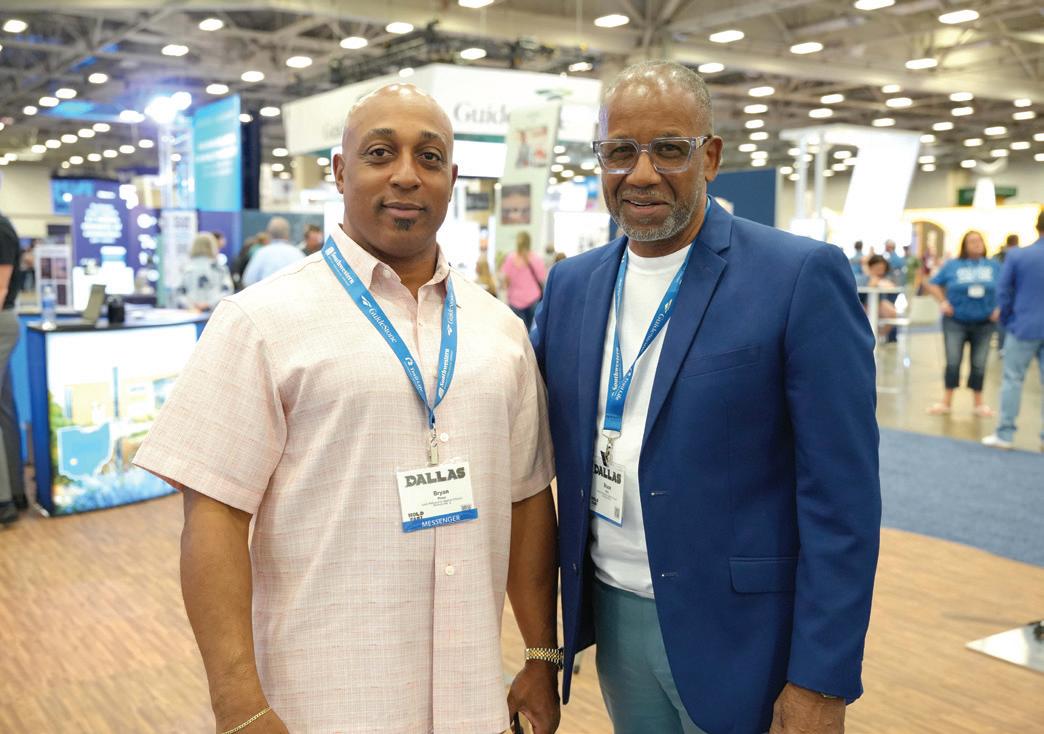
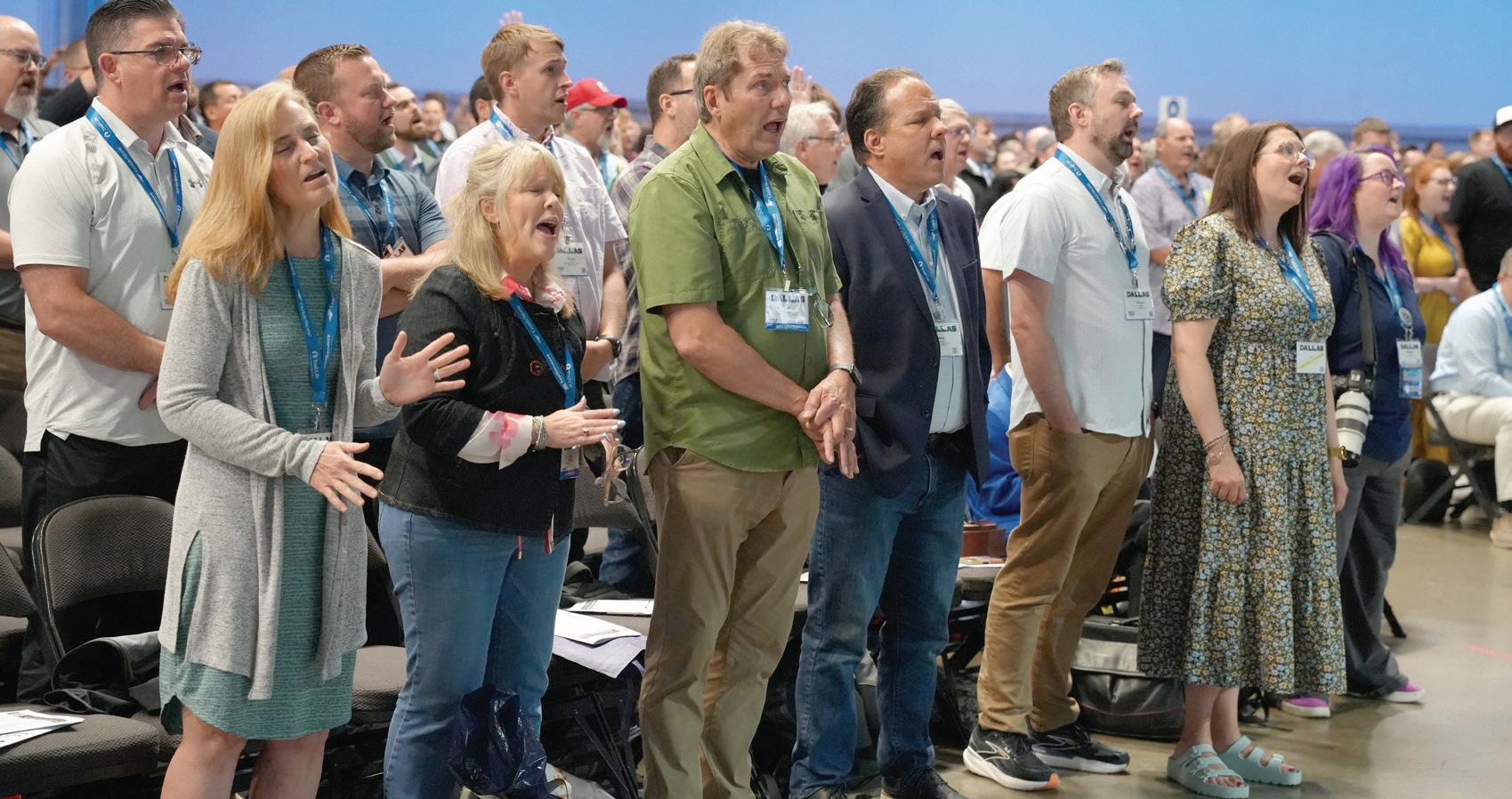
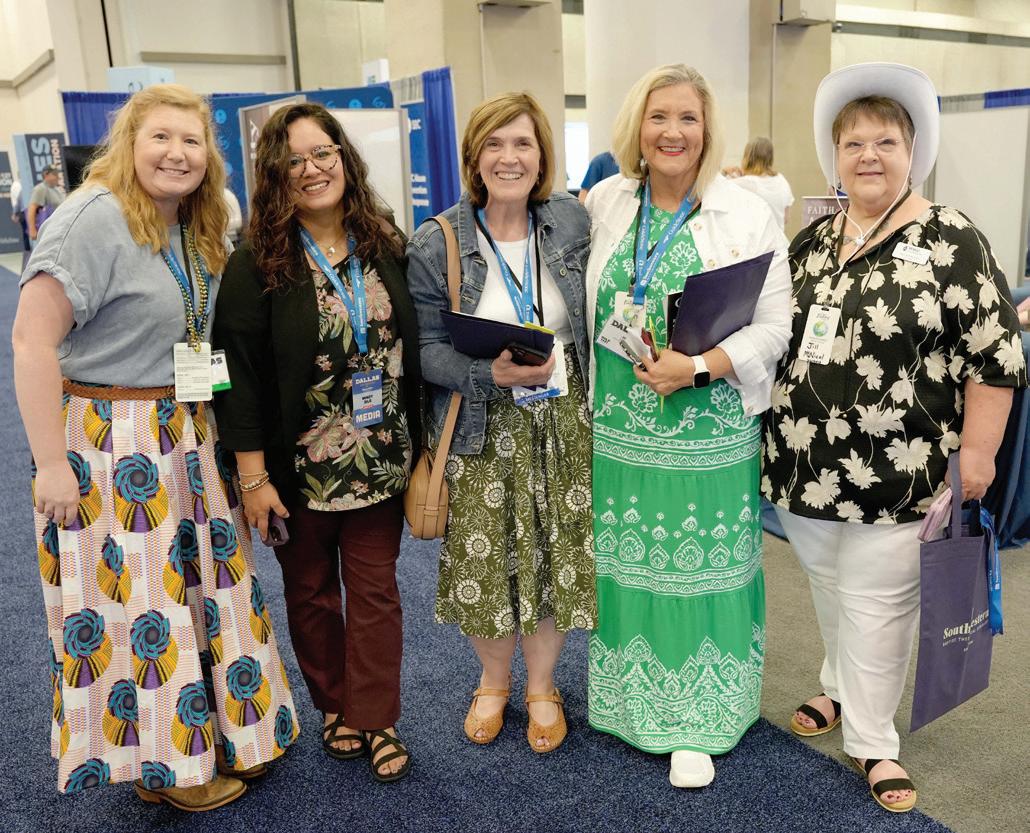
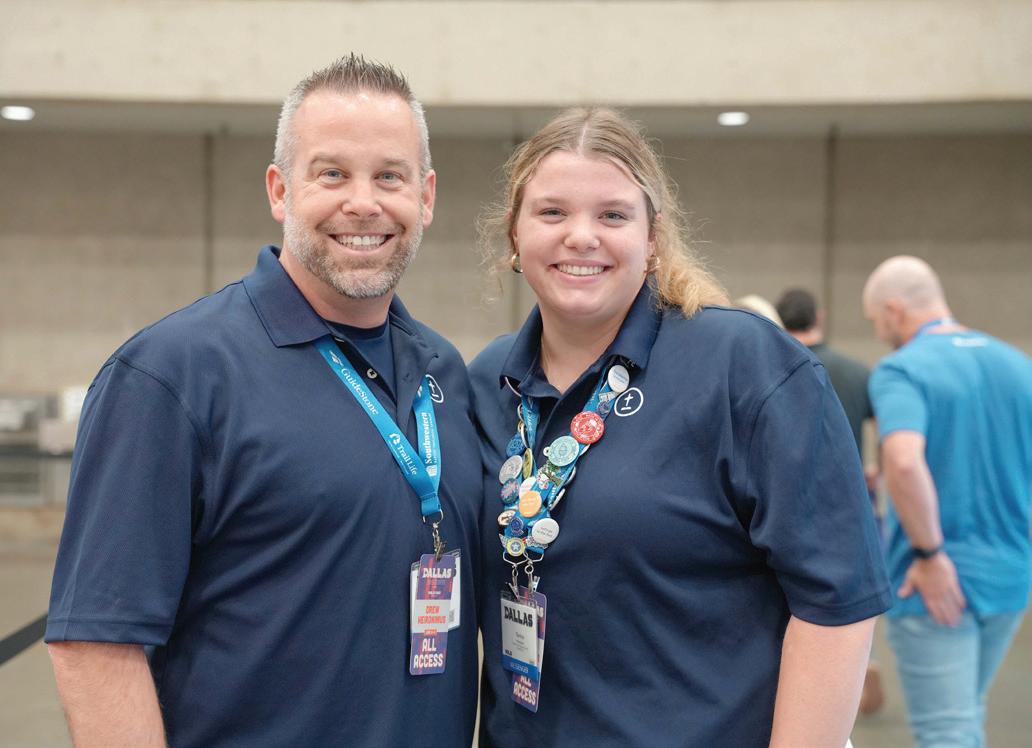

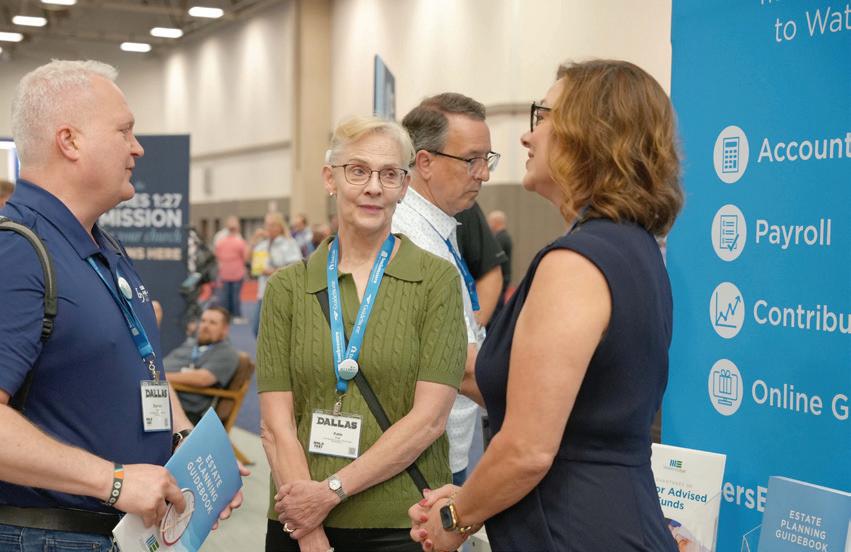
WE’RE ALL FAMILY–
7. During a focus on adoption at the NAMB Send Luncheon, Jacob and Makenzie Goble and children (Rooted Community, Lebanon) were invited on stage.
8. Shannon (IBSA Missions Director) and Katy Ford talk with an exhibitor.

Nothing is scarier than change. (Well, maybe spiders are scarier, but I digress.) But here is the reality we face. Change is happening all the time, whether we like it or not. The real issue isn’t whether things will change, but how we deal with the change that is inevitable. So, let’s talk about navigating change at IBSA and in church life in general.
This is a season of change at IBSA. After 20 years of service, Executive Director Nate Adams will be retiring next year. Whether we like it or not, time has continued to march on and “young Nate Adams” has become “not so young Nate Adams.” Even as you read this, IBSA has an Executive Director Search Team working hard at the task of finding the next leader for our state convention.
How should IBSA navigate this change? What should we keep in mind as we consider the future? What are some lessons to keep in mind as we face the inevitable changes coming to our beloved organization?
Change can be helpful for organizations of all sizes. I love Nate Adams and am so grateful he has led IBSA so effectively for the past two decades.
He has, I remind you, made many helpful changes to IBSA during his long tenure. He has led us through many changes in personnel and in methodology along the way. He has constantly tried to push our large


organization to be effective in our mission of reaching our state with the gospel of Jesus Christ. He would be the first to remind us that change can be helpful. We will always need to consider finding methods that are effective in helping us reach Illinois for Christ. We will always need to evaluate our efficiency. Nate modeled that for us.
I hope the next Executive Director of Illinois Baptists can continue to help us become more effective and efficient. I hope he can help us continue to evaluate and scrutinize what we do. I hope he can help us reach our state and strengthen our churches and start new works and make a greater impact. I hope he has fresh ideas and new insights that lead us forward in our work together.
Change should be intentional. All churches and institutions change. Some change for the better and some change for the worse, but all organizations change.
IBSA won’t be able to recreate the past any better than our churches can. But IBSA can learn from the past to create a brighter future, just as our churches can. We can choose to change in ways that are beneficial and impactful and positive. We can change proactively to reach the next generations.
One of the things the search team is doing is identifying the traits, talents, and perspectives that are needed in our next Executive



“Those
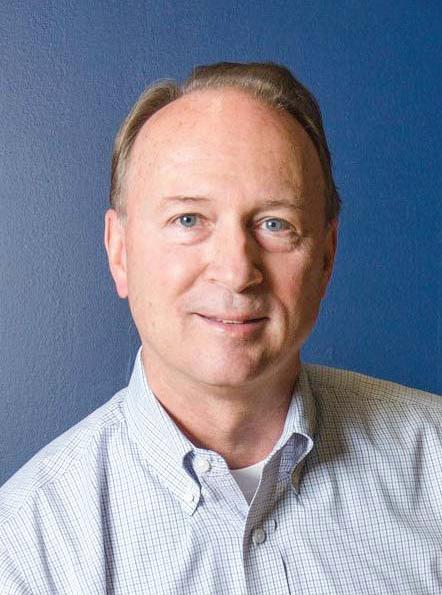
Director. They are examining the skills sets that are needed and the proficiencies that are required. They know that change in our state association is inevitable, but they want it to be intentional.
The search team wants the next Executive Director to be able to build upon the strong past we have enjoyed and the great potential we see coming. They want someone to help us reach the next generation in our state and to help our churches to band together in this important task God has given us.
Our changes need to be intentional changes that help us fulfill the mission given to us by our Lord Jesus.
I may still find spiders scary, but when I think correctly about the


inevitable nature of change that is coming to our association and our churches, I find change less frightening. God has worked in great ways in the history of Illinois Baptists. I am convinced that God is going to work in great ways in our future as well.
So, let’s embrace the work that God is doing. While our methods and personnel always change, our gospel never changes. The solid rock of faith in our Lord Jesus remains firm. We can trust the unchanging God in our ever-changing world.
God has blessed IBSA in the past. We are believing God for his continued blessings on the future. Our
Change can be beneficial, to our churches and for IBSA.
future is as bright as the promises of God. So, let’s go together on this great journey of reaching our state, nation, and world with the life-changing gospel of our Lord Jesus Christ!
Doug Munton is pastor of First Baptist Church of O’Fallon. He is serving as IBSA President.
The Nominations Committee will soon draft a slate of candidates for at least 30 elected positions in IBSA leadership. In addition to IBSA’s six committees, the Nominating Committee will recommend people to serve on the Association’s three boards: IBSA, Baptist Foundation of Illinois (BFI), and Baptist Children’s Home and Family Services (BCHFS).
The deadline to receive nominations is August 1. Forms are posted at IBSA.org/about/organization. Contact BarbTroeger@IBSA.org or 217-391-3107.
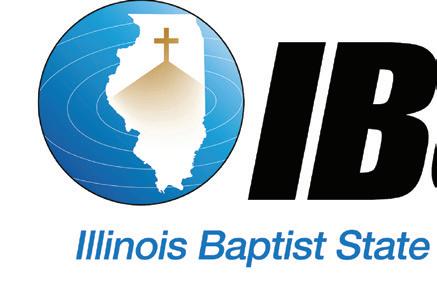

When we first meet the woman of Shunem in 2 Kings 4, she’s got a lot going for her. She’s hospitable, welcoming the prophet Elijah into her home for a meal every time he passes through town. She also has resources—enough to build an addition onto her home for Elijah to use as he comes and goes!
She’s comfortable enough that when Elijah asks what the Lord can do for her in return, she basically tells him she’s got everything she needs. She lives among her own people, and she’s doing fine.
There is one thing she doesn’t have, though. Her husband is old, and she has no son. Elijah knows this, even though she neglects to mention it. Through the mercy and provision of the Lord, the Shunammite woman has a child. He grows up until one day, he falls deathly ill. Her hope quickly running out, the woman goes directly to Elijah.
Shunammite’s house. The boy is healed. His mother is shown again that God is powerful and merciful to save and deliver. And we get two beautiful reminders of how God handles our deepest desires:
First, he sees them. Even when we would prefer to keep hidden the things that are most painful, God knows the desires of our hearts. From the outside, it looked like the Shunammite woman had everything. But God knew the one thing she wouldn’t say out loud.
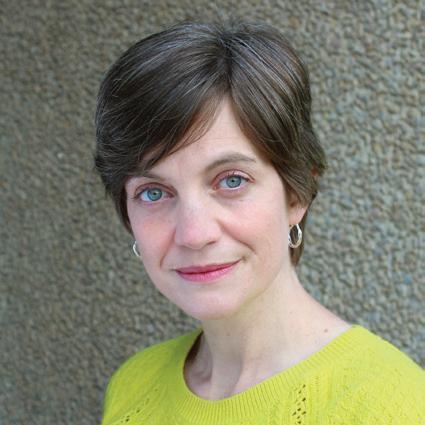
She bypasses his servant with an “all is well” on her way to tell the real story to the man of God. And that’s when we see her break, finally. I didn’t ask for this, she says. She had pled with Elijah not to lie to her when he told her she would have a son. And now, she’s lost him. But she hasn’t. Elijah goes back to the


Second, not only does God know those desires, he holds them in his hands. The Shunammite woman knew exactly where to go to plead for her son’s deliverance. Not her husband. Not Elijah’s servant. She goes straight to the prophet and doesn’t leave his side until he agrees to follow her back to Shunem, where he heals her son. God saw, and God saved. He does the same for us, knowing the desires of our hearts even when we are afraid to name them. He sees them, and he holds them in his hands.
Meredith Flynn is a wife, mother of two, and writer living in Springfield. She and her family are active members of Delta Church.


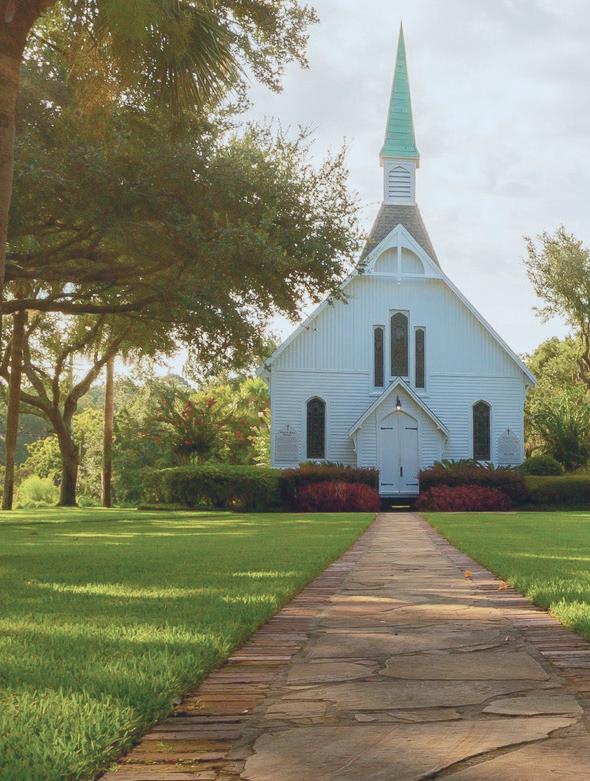


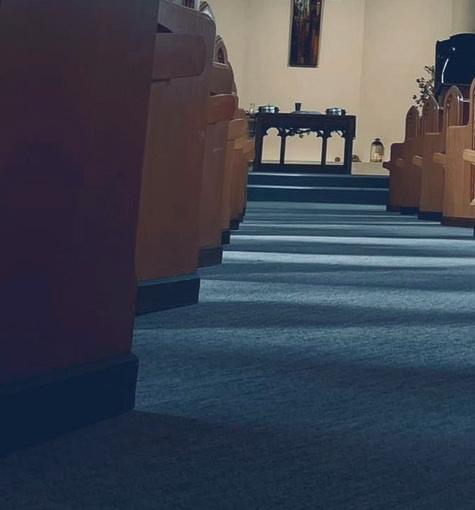
Send NETWORKING items to IllinoisBaptist@IBSA.org
First Baptist Church of Pinckneyville seeks a ww of Godly character, who preaches the Word, provides pastoral care, has good communication skills, and serves all people with compassion and love; with vision for evangelism and outreach to the next generation. Contact: Mike Cheek, 105 Mill Street, P. O. Box 157 Pinckneyville, IL 62274. fbcpvilleoffice@gmail.com
Grace Baptist Church of Granite City seeks a bivocational associate pastor, part-time, 10 hours per week. Under the direction of the lead pastor, this position could include taking over certain duties or by rotation or by substituting for absences, tailored to the gifts and talents of the individual and the needs of the church. For information, visit gbcgranite.org/job-opportunities.
Schram City Baptist Church seeks a bivocational pastor for a congregation of 15 in attendance, mostly senior adults and children. The demographics in the Hillsboro area indicate a significant unchurched population. Contact Beth Bailie, jdabbailie@gmail.com.
First Baptist Church of Brookport seeks a fulltime or bivocational pastor for a congregation averaging 65-75 on Sunday morning. The current pastor is retiring after 20 years’ service. Send resume to 700 Pell Road, Brookport IL 62910. Attn: Pastor Search Committee.




















































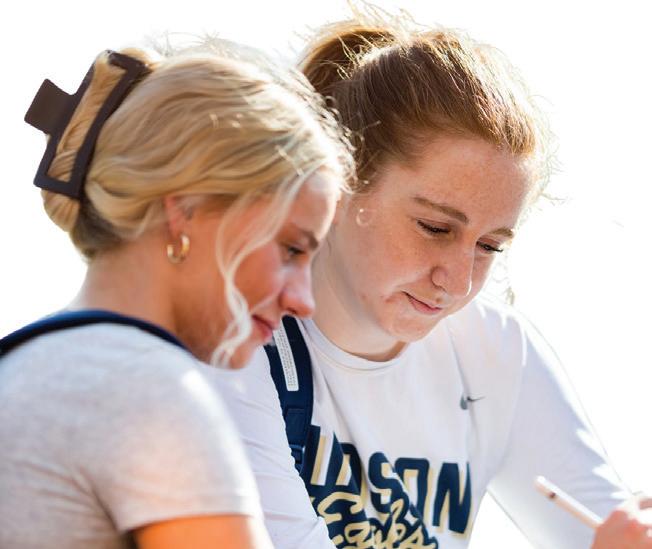




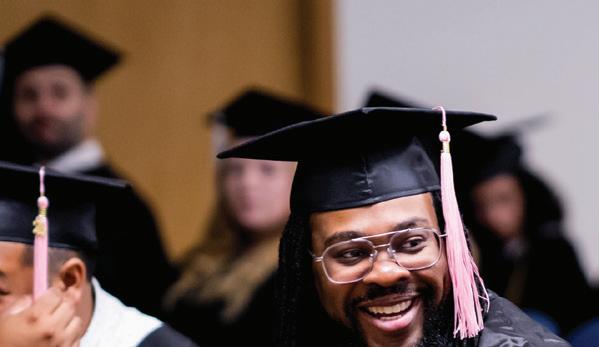







July
Leadership University
July 15: Central, IBSA Building, Springfield Info: IBSA.org/events/leadershipu-ibsa/
July 23: Connexion Church, Mt. Vernon
Info: IBSA.org/events/leadershipu-mtvernon/
July 29: Union Association Building, Metropolis Info: IBSA.org/events/leadershipu-metropolis/
What: Leadership University produces high-capacity volunteer church leaders with “7 Key Traits of a Leader” that Jesus modeled. Receive everything needed to discover and develop leaders who can take the church to the next level.
Time: 9 – 11:30 a.m., cost is free
Contact: PaulWestbrook@IBSA.org
July 18-19
Level Up Guy Camp
Where: Streator Baptist Camp
When: Friday 3 p.m. - Saturday 5 p.m.
What: A retreat for dads and sons, grandads and grandsons, mentors and mentees, and men and their friends.
Cost: $75 for adults, free for 18 and under Info: IBSA.org/events/level-up-guy-camp
Contact: JacobKimbrough@IBSA.org
July 21-27
Go Chicago
Where: Ashburn Baptist Church, Orland Park
When: Monday 2 p.m. - Sunday after church
What: Go Chicago is an immersive student missions experience where you will be involved in church planting, missions, and inner-city ministry. For students who’ve completed 5th grade through college.
Cost: $275 per student in IBSA churches, $350 per student in non-IBSA churches
Info: IBSA.org/gochicago
Contact: KevinJones@IBSA.org
August 14
Tech Training
Where: Immanuel, Benton
When: 6 p.m. – check-in, 6:30 p.m. – training begins
What: Specialized church tech training for pastors, tech and/or worship leaders and volunteers.
Cost: Free
Info: IBSA.org/events/techtraining
Contact: CarmenHalsey-Menghini@IBSA.org or BobDickerson@IBSA.org
August 22-23
Disaster Relief Training
Where: Lake Sallateeska Baptist Camp
When: Friday noon-8 p.m.; Saturday 8 a.m.-3:30 p.m.
What: Classes TBA
Cost: Current members are free. New members or those with expired badges cost $50.
Info: IBSA.org/dr
Contact: JanetSheley@IBSA.org

All Church Training
September 11: Wayne City BC, Wayne City (6-8 p.m.)
September 16: Friendship BC, Plainfield (6-8 p.m.)
September 18: First Baptist Church, Metropolis (6-8 p.m.)
September 25: Emmanuel BC, Sterling (9 a.m. - 12 p.m.)
What: A tune-up for your core ministries. Pastors, ministry leaders, and volunteers will receive training to lead a healthy, growing church.
Cost: Free
Info: IBSA.org/all-church-training
Contact: TammyButler@IBSA.org

Blooming Grove Baptist Church of McLeansboro is celebrating its 175th anniversary year. The celebration will last throughout the year with various events and memories. If you have a special memory of Blooming Grove Church, we invite you to mail it to the church to be posted in a memory book for all to read.
Send to: Blooming Grove Baptist Church 7709 Blooming Grove Road McLeansboro, IL 62859

September 13
Illinois Mission Day
What: Join in showing the love of Jesus in Illinois communities. Participate in ready-made, half-day outreach and service projects for the whole family. Illinois, it’s OUR mission!
Where: Various locations
Cost: Free Info: MissionIllinois.org

September 14-21
Mission Illinois Offering
What: Week of prayer and giving for state missions. Your MIO giving stays 100% here, and supports work in Illinois.
Where: Your Church
Info: MissionIllinois.org
November 4-5
IBSA Annual Meeting: Celebrating Unity & Cooperation
What: Messengers and guests from the nearly 900 IBSA churches gather for some business and a lot of inspiration. Where: Crowne Plaza, Springfield
Info: IBSAannualmeeting.org
Contact: BarbTroeger@IBSA.org
More details, registration coming July 21
see the IBSA calendar for more events. www.ibsa.org/calendar/
Jeremy Montgomery is the new pastor at Bethel Baptist Church in Bourbonnais. A recent graduate of New Orleans Baptist Theological Seminary with a degree in Church Ministry and Biblical Studies, the Little Rock native has served in ministry positions for six years. He is married to Sara, a labor and delivery nurse originally from the north Chicago suburbs. They have three children.
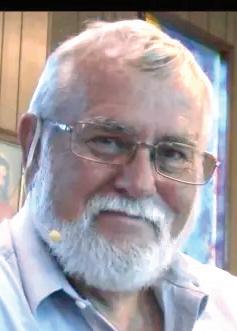
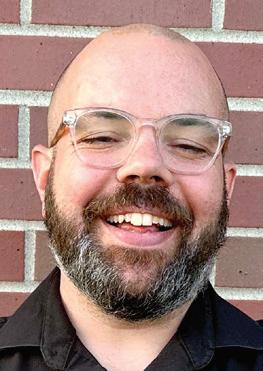
Richard Ulrich became senior pastor of Lincoln Avenue Baptist Church in Jacksonville on June 1. A Missouri native, Ulrich served as pastor of FBC Ewing, Mo. He holds degrees from Hannibal-LaGrange University (B.S., Bible) and Southwestern Seminary (M.A. Islamic Studies). Ulrich served as an IMB Journeyman in Middle Eastern Countries. He is married to Ashley, and they have three children.
Michael Lee Smith, 71, of Harrisburg died June 5. He worked as a mechanic, truck driver, and served as pastor of Gaskins City Missionary Baptist Church in Harrisburg where he found great joy in ministering to and serving his church family that he loved. He was also a member of Shawnee Classic Iron and Memory Lane Auto Fest, sharing his passion for classic cars with many. Smith is survived by his wife of 55 years, Connie, two daughters, four grandchildren, three siblings and their families.
On the centennial of the SBC’s statement of faith, let’s explore what we believe and take time to reinforce a solid foundation.
Shortly after the Chicago Pope, Leo XIV, was elected, a man who has attended the church my friend pastors said, “I think I’m gonna join the Catholic church. I like this new pope. And besides, they have more sacraments than you do.”
“Actually,” my friend responded, “Baptists don’t have any sacraments. We have ordinances.” He tried to explain the distinction, but its importance was lost on the wanderer.
Catholics and some Protestants observe up to seven sacraments. They are seen as the means by which God dispenses grace, so practicing them frequently becomes vital for the person who wants to remain in good stead with the Almighty. And it places both responsibility and pressure on the person to earn God’s grace.
But our ordinances— and there are only two—commemorate and celebrate what God has already done. In baptism, the picture is clear that God saved the believer who is symbolically buried with Christ in death, and raised to walk in newness of life, as Paul and many a baptizing pastor have said. And in the Lord’s Supper, God isn’t secreting his Spirit into the believer by way of the stomach, but it is a picture of the state of the heart. Any participant or onlooker is reminded of the sacrifice of Jesus on the cross. Here’s how we were saved, the ordinances proclaim, not how we become saved.
not prescribed in Scripture.
Reformed Worship says that observance of the Lord’s Supper four to six times a year is a common practice among Protestant churches. Especially among those in the free tradition, reserving communion for occasional worship services keeps it from becoming ordinary.
The National Association of Evangelicals says monthly communion is the norm in 70% of evangelical churches. And while the weekly eucharist is most common in Catholic and Anglican churches, the Gospel Coalition says sharing the Lord’s Supper every Sunday is becoming “a badge of honor” in some Baptist and Presbyterian congregations—albeit unusual. There is one controversial bit in the year 2000 amendments to the article on the Lord’s Supper. As a supervisor of mine would ask as he departed my office door, “Open or closed,” the language of how communion is observed has moved from open to closed.
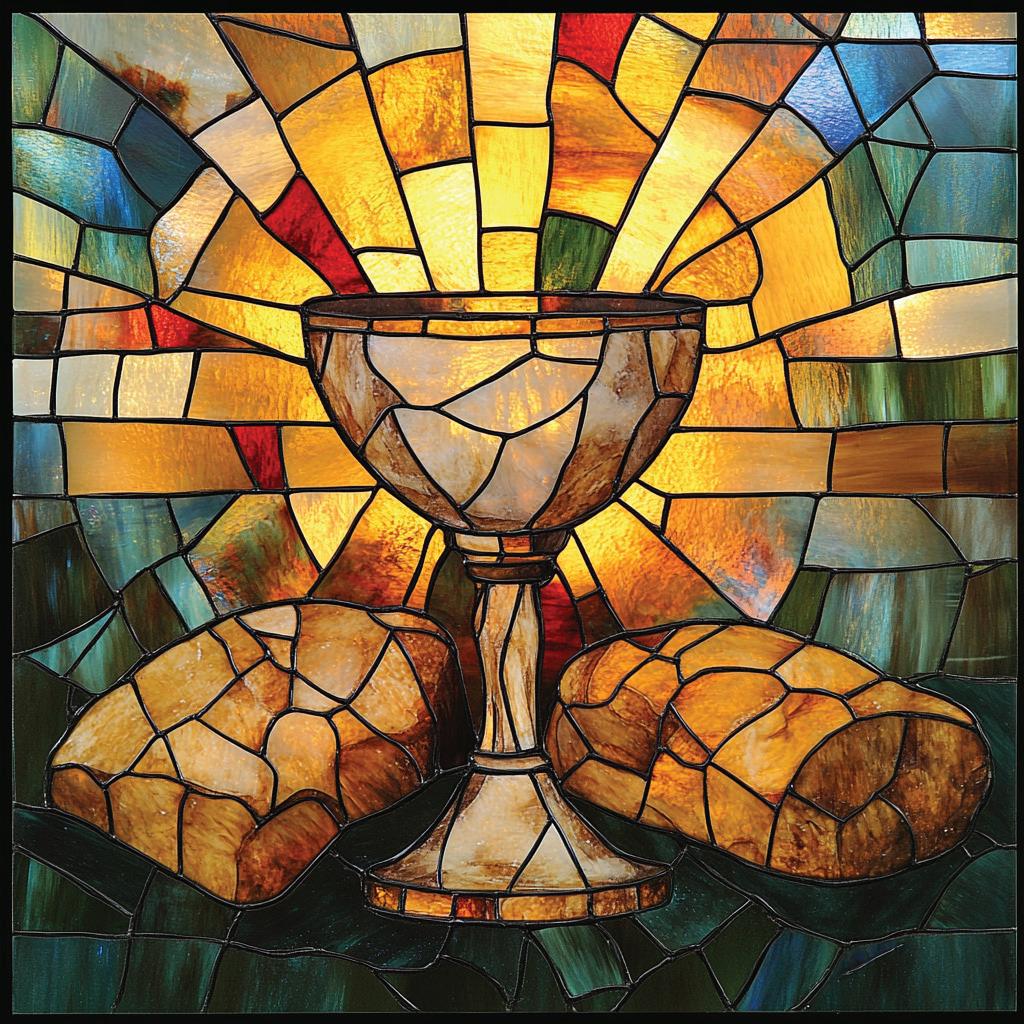
In the Baptist Faith and Message (2000) article 7, the Baptist practice of believer’s baptism by immersion is clear. Those capable of professing their faith in Jesus as Savior go under the water in the same way Jesus was baptized by John. Baptism is identification with Christ and a public declaration of faith, but there is no sacramental magic in the water.
A few Baptist churches, mostly outside Southern Baptist life, will accept baptism by another mode (such as sprinkling) or from a church with a different theology (such as regeneration actually happening at the moment of baptism). But the BF&M is clear that the baptism of people mature enough to make their own decision to follow Christ, after their salvation experience, is the Baptist way.
For those who find the ordinances an emotional experience, their observance is a holy nudge to stay close. How often is
With believer’s baptism expressly as a prerequisite for participation, the broader invitation to all Christians to come to the table is reduced. Some local churches will go so far as to say only members of that particular congregation may participate. This form of closed communion is not ecumenical; it does not travel to the homebound; it is not shared in smaller groups; it is not used to draw people to Jesus. In this way, commemorating his sacrifice is for a specific group of believers only. While not all Baptists hold this view, those who practice closed communion could be called zealous to preserve its holiness.
Both Articles 7 and 8 prescribe the regular and common observances of a zealous people in response to a jealous God: Identifying with Christ in baptism, remembering his grace extended at Calvary, and reserving one day weekly for his worship. The BF&M says the Christian’s conscience governs how God is to be worshiped on his day, but as the culture frays the edges of sabbath, keeping the day holy is a growing challenge.
And answering the question “Can I mow my grass on Sunday?” becomes fraught with debate over legalism. If only there were a sacrament to cover that.
—Eric Reed
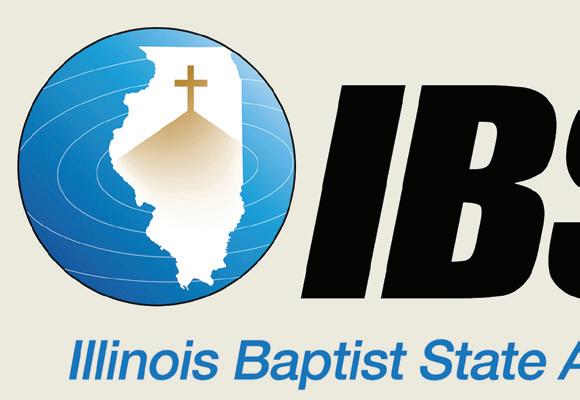

Christian baptism is the immersion of a believer in water in the name of the Father, the Son, and the Holy Spirit. It is an act of obedience symbolizing the believer’s faith in a crucified, buried, and risen Saviour, the believer’s death to sin, the burial of the old life, and the resurrection to walk in newness of life in Christ Jesus. It is a testimony to his faith in the final resurrection of the dead. Being a church ordinance, it is prerequisite to the privileges of church membership and to the Lord’s Supper.
The Lord’s Supper is a symbolic act of obedience whereby members of the church, through partaking of the bread and the fruit of the vine, memorialize the death of the Redeemer and anticipate His second coming.
Matt 3:13-17; 26:26-30; 28:19-20; Mark 1:9-11; 14:22-26; Luke 3:21-22; 22:19-20; John 3:23; Acts 2:41-42; 8:35-39; 16:30-33; 20:7; Rom 6:3-5; 1 Cor 10:16,21; 11:23-29; Col 2:12.
The first day of the week is the Lord’s Day. It is a Christian institution for regular observance. It commemorates the resurrection of Christ from the dead and should include exercises of worship and spiritual devotion, both public and private. Activities on the Lord’s Day should be commensurate with the Christian’s conscience under the Lordship of Jesus Christ.
Exod 20:8-11; Matt 12:1-12; 28:1ff.; Mark 2:27-28; 16:1-7; Luke 24:1-3,33-36; John 4:21-24; 20:1,19-28; Acts 20:7; Rom 14:5-10; I Cor 16:1-2; Col 2:16; 3:16; Rev 1:10.
of church goers say the Sabbath still applies, what do they do on those days? —Lifeway Research
